#Portrait Berlin Swing
Explore tagged Tumblr posts
Photo

(Image of The Belton Conversation Piece by Mercier, Philippe (1689-1760)から)
Philippe Mercier (Berlin 1689 London 1760). Oil painting on canvas, The Belton Conversation Piece by Philippe Mercier (Berlin 1689 London 1760), signed: Ph. Mercier Pinxit, circa 1725-26. Eight full-length portraits of figures in the park at Belton with south front of Belton House in the left background. The figures are, left to right: Philippe Mercier seated on the ground facing right, his right leg outstretched, a sketchpad on his lap, a drawing implement in his right hand. Above him stands Sir John Brownlow, Viscount Tyrconnel, a cane in his left hand, dressed in a fawn velvet suit, wearing the sash of the Order of the Bath and its insignia. Mrs Frances Dayrell, Lady Tyrconnel's cousin is seated in a swing wearing a pale green satin closed gown with a muslin apron and a muslin kerchief with pink bows on the bodice and a white muslin cap also with pink bows; A black page wearing a turban stands behind her dressed in a dark brown suit with gold buttons and gold edging to his coat, brown breeches and brown stockings. The invalid Lady Tyrconnel is seated in a wheeled chair set on a green platform with red wheels, a dog on her lap. She is dressed in a closed gown comprising a brown satin bodice and skirt both decorated with gold military style frogging. She also wears an ornament (jewelled?) of flowers in her hair. Francis Dayrell stands next to her, his left hand in his pocket, his right hand tucked into his open grey coat which is buttoned at the waist; Savile Cockayne Cust pulls a rope attached to the swing and wears a pink coat buttoned to the neck trimmed with silver edging. William Brownlow, Lord Tyrconnel's brother, leaned against a tree trunk, his left leg crossed over his right, wearing a pale brown coat, unbuttoned, with deep pink cuffs and a matching pink waistcoat. He also wears pink stockings. With the exception of the black page, all the men wear shoulder-length powdered wigs parted in the centre. Belton House, Lincolnshire (Accredited Museum)
0 notes
Text
The von Beilschmidt home
So I downloaded a whole lot of CC from HeyHarrie, watched some sims 4 build videos on youtube and got inspired to make another version of Gil’s 19th century home! The exterior was inspired by a bunch of old mansions on google and the floor plan is inspired by the Ward Den mansion from Del Sol Valley (because while I loathe how it looks on the outside, the interior floor plan kinda slaps), so you’ll see that I have the same staircase layout and the ballroom in the middle.
I may put the shell up on the gallery or re-furnish it to use base game only items so y’all can download and explore it on your own, because right now I’m using a couple of packs plus CC items.
Anyway, I loved how it turned out so let me take you on a tour!

So here’s the exterior of the manor! I imagined this estate was a gift from King Frederick I to his new kingdom in 1701. Gilbert, however, didn’t fancy living on his own in such a big home so for most of the 18th century, he lived in a smaller town home in Berlin and then later living in Sanssouci with Frederick II. As such, the house mostly sat empty, except for the few times when soldiers were temporarily billeted there.
That changed in the 19th century when Ludwig came into his care and he thought it would be nice to raise the boy in a bigger space with more grounds for him to run and play in. The manor was renovated and they moved in with Gilbert’s existing household staff while the town home was converted into a clinic. Interior pics under the cut!
Floor plan
1st floor:

First floor has the entrance foyer with the double grand staircase that leads up to the second floor. Through an archway in the middle, there’s the ballroom, which has a door that leads out to the back courtyard. To the left, there’s the formal sitting room and to the right there’s the dining room. Off the dining room is the kitchen. Originally I wanted it to be just sort of a prep/serving area and have a staircase leading downstairs to the actual kitchen but the sims won’t let staircases be put under foundations so I had to make do! Each hallway has a downstairs bathroom for guests to use.

Second floor has all the bedrooms. To the left, you’ll find Gilbert’s study and to the right, there’s the guest bedroom. There’s also Gil’s bedroom and Ludwig’s bedroom, separated by the main bathroom in the middle.

Outside, we have the back courtyard and a hedge maze to the right. There’s also an outdoor lounge / dining area under a pergola and a small play area for Ludwig.

So there’s the pergola with the dining table underneath. Ludwig’s little play area has a swing hanging from the tree (built by his dad) and a little tent. The monkey bars are there just because it was cute. I also imagined there would be a stable nearby where they kept all the horses and the carriage.

Ballroom with the wooden dance floor set in the middle of the checkered marble tile.

The sitting room with the couches, bookshelves, and a writing desk. Lud has his own little desk there for him to sit and read at too. Not pictured, the fireplace in front of all the seats.

The Dining room and the archway that leads into the kitchens.

View of the staircase and the second floor landing. Ideally there would be more paintings hung up on the walls here, mostly family portraits and the occasional portrait of Fritz. Door on the far left goes to the study, door on far right goes into the guest bedroom, usually used by Johanna whenever she makes the trip to visit her brother and her nephew. Middle door leads to the main bath, to the left goes into the master bedroom, and to the right goes into Ludwig’s room.


Main bathroom. The only one with a tub.
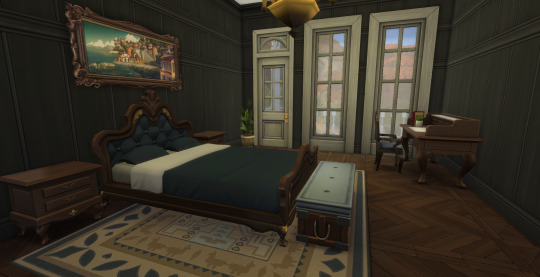
Main Bedroom. Very sparsely decorated, just the way Gil likes it.

Ludwig’s room. Yes, that is a canopy. Why? Because it was cute. He’s got a little desk here too, a bookcase, and a little castle play set. He’s also got his set of tin soldiers lying around somewhere, modelled after the Prussian Army under Frederick the Great. General von Seydlitz always goes missing from the set for one reason or another and they find him in the weirdest places.
Nowadays, his room has a full-sized bed and desk, though the castle playset is still on display on a shelf somewhere.



Gilbert’s study and you may recognize the double windows from the asks when I draw Gil sitting at his desk! There is a door leading out to the terrace and bookcases along the walls which are full of everything from Prussian Law books, medical textbooks, and his giant collection of personal journals and patient case files.

And finally, here’s the guest bedroom, which also has a door out to the terrace!
#not an ask#[ headcanon ]#( i FINALLY FINISHED FURNISHING THIS BAD BOY#that took forever fdjfkj#longer than the exterior tbh#also excuse the dead plants it's fall in game djkdkj )
59 notes
·
View notes
Text
Ethel Waters

Ethel Waters (October 31, 1896 – September 1, 1977) was an American singer and actress. Waters frequently performed jazz, swing, and pop music on the Broadway stage and in concerts. She began her career in the 1920s singing blues. Waters notable recordings include "Dinah", "Stormy Weather", "Taking a Chance on Love", "Heat Wave", "Supper Time", "Am I Blue?", "Cabin in the Sky", "I'm Coming Virginia", and her version of "His Eye Is on the Sparrow". Waters was the second African American to be nominated for an Academy Award. She was the first African American to star on her own television show and the first African-American woman to be nominated for a Primetime Emmy Award.
Waters was born in Chester, Pennsylvania on October 31, 1896 (some sources state her birth year as 1900) as a result of the rape of her teenaged African-American mother, Louise Anderson (1881–1962), by John Waters (1878–1901), a pianist and family acquaintance from a middle-class African-American background. Waters' family was very fair skinned, her mother in particular. Many sources, including Ethel herself, have reported for years that her mother was 12 or 13 years old at the time of the rape, 13 when Ethel was born. Stephen Bourne opens his 2007 biography, Ethel Waters: Stormy Weather, with the statement that genealogical research has shown that she may have been in her late teens.
Waters played no role in raising Ethel. Soon after she was born, her mother married Norman Howard, a railroad worker. Ethel used the surname Howard as a child and then reverted to her father's name. She was raised in poverty by Sally Anderson, her grandmother, who worked as a housemaid, and with two of her aunts and an uncle. Waters never lived in the same place for more than 15 months. Of her difficult childhood, she said "I never was a child. I never was cuddled, or liked, or understood by my family."
Waters grew tall, standing 5 feet 9.5 inches (1.765 m) in her teens. According to jazz historian and archivist Rosetta Reitz, Waters's birth in the North and her peripatetic life exposed her to many cultures. Waters married at the age of 13, but her husband was abusive, and she soon left the marriage and became a maid in a Philadelphia hotel, working for $4.75 per week. On her 17th birthday, she attended a costume party at a nightclub on Juniper Street. She was persuaded to sing two songs and impressed the audience so much that she was offered professional work at the Lincoln Theatre in Baltimore. She recalled that she earned the rich sum of $10 per week, but her managers cheated her out of the tips her admirers threw on the stage.
After her start in Baltimore, Waters toured on the black vaudeville circuit, in her words "from nine until unconscious." Despite her early success, she fell on hard times and joined a carnival traveling in freight cars headed for Chicago. She enjoyed her time with the carnival and recalled, "the roustabouts and the concessionaires were the kind of people I'd grown up with, rough, tough, full of larceny towards strangers, but sentimental and loyal to their friends and co-workers." But she did not last long with them and soon headed south to Atlanta, where she worked in the same club as Bessie Smith. Smith demanded that Waters not compete in singing blues opposite her. Waters conceded and sang ballads and popular songs. Around 1919, Waters moved to Harlem and became a performer in the Harlem Renaissance of the 1920s.
Her first Harlem job was at Edmond's Cellar, a club with a black patronage that specialized in popular ballads. She acted in a blackface comedy, Hello 1919. Jazz historian Rosetta Reitz pointed out that by the time Waters returned to Harlem in 1921, women blues singers were among the most powerful entertainers in the country. In 1921, Waters became the fifth black woman to make a record, for tiny Cardinal Records. She later joined Black Swan, where Fletcher Henderson was her accompanist. Waters later commented that Henderson tended to perform in a more classical style than she preferred, often lacking "the damn-it-to-hell bass."
She recorded for Black Swan from 1921 through 1923. Her contract with Harry Pace made her the highest paid black recording artist at the time. In early 1924, Paramount bought Black Swan, and she stayed with Paramount through the year.
She first recorded for Columbia in 1925, achieving a hit with "Dinah". She started working with Pearl Wright, and they toured in the South. In 1924, Waters played at the Plantation Club on Broadway. She also toured with the Black Swan Dance Masters. With Earl Dancer, she joined what was called the "white time" Keith Vaudeville Circuit, a vaudeville circuit performing for white audiences and combined with screenings of silent movies. They received rave reviews in Chicago and earned the unheard-of salary of US$1,250 in 1928. In September 1926, Waters recorded "I'm Coming Virginia", composed by Donald Heywood with lyrics by Will Marion Cook. She is often wrongly attributed as the author. The following year, Waters sang it in a production of Africana at Broadway's Daly's Sixty-Third Street Theatre. In 1929, Waters and Wright arranged the unreleased Harry Akst song "Am I Blue?", which was used in the movie On with the Show and became a hit and her signature song.
In 1933, Waters appeared in a satirical all-black film, Rufus Jones for President, which featured the child performer Sammy Davis Jr. as Rufus Jones. She went on to star at the Cotton Club, where, according to her autobiography, she "sang 'Stormy Weather' from the depths of the private hell in which I was being crushed and suffocated." In 1933, she had a featured role in the successful Irving Berlin Broadway musical revue As Thousands Cheer with Clifton Webb, Marilyn Miller, and Helen Broderick.
She became the first black woman to integrate Broadway's theater district more than a decade after actor Charles Gilpin's critically acclaimed performances in the plays of Eugene O'Neill beginning with The Emperor Jones in 1920.
Waters held three jobs: in As Thousands Cheer, as a singer for Jack Denny & His Orchestra on a national radio program, and in nightclubs. She became the highest-paid performer on Broadway. Despite this status, she had difficulty finding work. She moved to Los Angeles to appear in the 1942 film Cairo. During the same year, she reprised her starring stage role as Petunia in the all-black film musical Cabin in the Sky directed by Vincente Minnelli, and starring Lena Horne as the ingenue. Conflicts arose when Minnelli swapped songs from the original script between Waters and Horne. Waters wanted to perform "Honey in the Honeycomb" as a ballad, but Horne wanted to dance to it. Horne broke her ankle and the songs were reversed. She got the ballad and Waters the dance. Waters sang the Academy Award nominated "Happiness is Just a Thing Called Joe".
In 1939 Waters became the first African American to star in her own television show, before the debut of Nat King Cole's in 1956. The Ethel Waters Show, a variety special, appeared on NBC on June 14, 1939. It included a dramatic performance of the Broadway play Mamba's Daughters, based on the Gullah community of South Carolina and produced with her in mind. The play was based on the novel by DuBose Heyward.
Waters was nominated for an Academy Award for Best Supporting Actress for the film Pinky (1949) under the direction of Elia Kazan after the first director, John Ford, quit over disagreements with Waters. According to producer Darryl F. Zanuck, Ford "hated that old...woman (Waters)." Ford, Kazan stated, "didn't know how to reach Ethel Waters." Kazan later referred to Waters's "truly odd combination of old-time religiosity and free-flowing hatred."
In 1950, she won the New York Drama Critics Circle Award for her performance opposite Julie Harris in the play The Member of the Wedding. Waters and Harris repeated their roles in the 1952 film version.
In 1950, Waters was the first African-American actress to star in a television series, Beulah, which aired on ABC television from 1950 through 1952.
It was the first nationally broadcast weekly television series starring an African American in the leading role. She starred as Beulah for the first year of the TV series before quitting in 1951, complaining that the portrayal of blacks was "degrading." She was replaced by Louise Beavers in the second and third season. She guest-starred in 1957 and 1959 on NBC's The Ford Show, Starring Tennessee Ernie Ford. In a 1957 segment, she sang "Cabin in the Sky".
Her first autobiography, His Eye Is on the Sparrow, (1951), written with Charles Samuels, was adapted for the stage by Larry Parr and premiered on October 7, 2005.
In 1953, she appeared in a Broadway show, At Home With Ethel Waters that opened on September 22, 1953 and closed October 10 after 23 performances.
Waters married three times and had no children. When she was 13, she married Merritt "Buddy" Purnsley in 1909; they divorced in 1913. During the 1920s, Waters was involved in a romantic relationship with dancer Ethel Williams. The two were dubbed "The Two Ethels" and lived together in Harlem.She married Clyde Edwards Matthews in 1929, and they divorced in 1933. She married Edward Mallory in 1938; they divorced in 1945. Waters was the great-aunt of the singer-songwriter Crystal Waters.
In 1938, Waters met artist Luigi Lucioni through their mutual friend, Carl Van Vechten. Lucioni asked Waters if he could paint her portrait, and a sitting was arranged at his studio at 64 Washington Square South. Waters bought the finished portrait from Lucioni in 1939 for $500. She was at the height of her career and the first African American to have a starring role on Broadway. In her portrait, she wore a tailored red dress with a mink coat draped over the back of her chair. Lucioni positioned Waters with her arms tightly wrapped around her waist, a gesture that conveyed vulnerability, as if she were trying to protect herself. The painting was considered lost because it had not been seen in public since 1942. Huntsville (Alabama) Museum of Art Executive Director Christopher J. Madkour and historian Stuart Embury traced it to a private residence. The owner considered Waters to be "an adopted grandmother" but she allowed the Huntsville Museum of Art to display Portrait of Ethel Waters in the 2016 exhibition American Romantic: The Art of Luigi Lucioni where it was viewed by the public for the first time in more than 70 years. The museum acquired Portrait of Ethel Waters in 2017, and it was shown in an exhibition in February 2018].
By 1955, Waters was deeply in debt for back taxes; the IRS seized royalties of her work. She lost tens of thousands in jewelry and cash in a robbery.[35] Her health suffered, and she worked sporadically. Yet she had faced lean times before. A turning point came in 1957 when she attended the Billy Graham Crusade in Madison Square Garden. She entered the Garden that night a disillusioned, lonely, 61-year-old woman. She had become successful at giving out happiness, but her personal life lacked peace. She was in debt, had physical problems, weighed too much to perform comfortably, and was worried about her career.
Years later, she gave this testimony of that night, "In 1957, I, Ethel Waters, a 380-pound decrepit old lady, rededicated my life to Jesus Christ, and boy, because He lives, just look at me now. I tell you because He lives; and because my precious child, Billy, gave me the opportunity to stand there, I can thank God for the chance to tell you His eye is on all of us sparrows." In her later years, Waters often toured with the preacher Billy Graham on his crusades.
Waters died on September 1, 1977, aged 80, from uterine cancer, kidney failure, and other ailments, in Chatsworth, California. She is buried at Forest Lawn Memorial Park (Glendale).
https://en.wikipedia.org/wiki/Ethel_Waters
15 notes
·
View notes
Text
YOI fanfic recommendations: Historical AUs
There’s a surprising number of Historical AUs for Victuuri/YOI on ao3. I haven’t read them all, and there’re still unfinished historical AUs in my to read. I decided to just go ahead and share the post as it is and eventually make a second post, or a reblog with additions. In this post I will focus on those that are only historical AUs, and primarily based on our world (meaning I won’t name fics that also have timetravel/fantasy/etc. elements, or made up countries, those deserve a separate post).
The order in which I name the fics goes by oldest to youngest in terms of historical setting. The fics I marked with *** fall into the category of heavy angst / are a heavy read.
I’m sorry for not going into detail about what I loved about them or leave comments here, because I’m trying to keep the post’s length under control. All of these fics deserve a commentary and a detailed recommendation post of their own, but that wouldn’t be managable for me timewise.
Please share this post (and the love), so more people can see the recommendations. Also if you start reading some of these, please consider leaving the writers Kudos and maybe even a comment. We writers love feeling recognised and cherished! It motivates us to write on ♡ Also this is a hecking long post, so you’ll find them under the cut.
Oneshots and Stories under 20k words
Becoming a Tenant for Life by Dawn on ICE (Dawn_Blossom) [ T | no warnings | Victuuri | regency AU | inspired by Jane Austen | 2928 words ] Summary: “You said something about my brother, didn’t you! And now Mr. Katsuki’s run off like a coward because of it!” “I only told Mr. Katsuki the truth—that Mr. Nikiforov is friendly with everyone, and he shouldn’t risk his future and his money on a man that doesn’t love him,” Lord Leroy explains defensively. Yuri has to save Victor's love life. God, he hates high society.
Private Theatricals by Watergaw [ G | no warnings | Victuuri | regency AU | inspired by Jane Austen | 1411 words ] Summary: Mr Victor Nikiforov, rich, handsome, accomplished, and quite the most eligible bachelor in four counties, has a problem. His friend Giacometti has a solution.
when pain is over, the remembrance of it often becomes a pleasure by thewalrus_said [ G | no warnings | Victuuri | regency AU | inspired by Jane Austen | 19.072 words ] Summary: Yuuri felt his body grow cold at the name; he had known a Mr. Nikiforov, once upon a time. Five years after the implosion of their acquaintance, Mr. Viktor Nikiforov returns to —shire society, bringing in tow a young cousin. Mr. Katsuki must navigate these once-familiar waters without giving further offense, all while keeping his own heart firmly protected. (A Persuasion AU)
Warm as the Ruby/Pure as the Pearl by Ravensmores [ M | no warnings | Victuuri | regency AU | 2391 words ] Summary: He’d told himself it was ridiculous to feel self-conscious at his own engagement party, that greeting guests on Victor’s arm was going to be the greatest pleasure, yet no sooner had they entered the ballroom than the pointed stares of his friends and colleagues were already proving too much. He could feel the words like stones being hurled at the back of his head as they toured the room, crudely hidden behind gloves and fans. Common Cheap Mistake (...)
a truth universally acknowledged by FullmetalChords [ E | no warnings | Victuuri | regency AU | 1995 words ] Summary: A mid-banquet blizzard strands Yuuri and Lord Nikiforov at Lord Giacometti's mansion, requiring them to share a bedchamber until the end of the storm.
Take My Breath Away by IncandescentAntelope [ E | no warnings | Victuuri | regency AU | angst with a happy ending | 17.380 words ] Summary: The son of Earl Dmitry Nikiforov, Viktor lives a rather dull life; he has no want to take his father’s title, but he must. Viktor’s family insists on an updated portrait, and though Viktor despises the idea, he certainly is interested in the artist.
In Thine Own Heart by EmHunter [ E | creator choose not to use archive warnings | Victuuri | Victorian AU | Prostitution | 17.964 words ] Summary: Lord Victor Nikiforov knows nothing about physical pleasures and is given time with a rent boy of his choice. This is how Yuuri comes into Victor’s life, a rent boy from London’s most exclusive establishment, one of its best kept secrets. A gift bestowed on Victor by his best friend for a limited time.
Let Me call You Sweetheart*** by deripmaver [ T | graphic depictions of violence | Victuuri | Post WW1/1920s | PTSD | Angst and Hurt/Comfort | 9410 words ] Summary: The Great War is over, the Jazz Age is in full swing - and Yuuri Katsuki wanders aimlessly around Paris, looking for something he lost, long ago.
Auld Lang Syne*** by IncandescentAntelope [ T | no warnings | Victuuri | Post WW2 | angst with a happy ending | 4034 words ] Summary: It's New Year's Eve, 1945, and it has been four years since Yuuri and Viktor were separated to serve in the war. The war has ended, but Yuuri hasn't heard from his husband since August.
Multi Chapter Fics above 20k words
Healthy Impropriety by mtothedestiel [ E | no warnings | Victuuri | regency AU | slow burn | angst with a happy ending | discrimination free | 29.496 words | completed ] Summary: Victor is the wealthy master of the Nikiforov estate. At a society party he's swept off his feet by the mysterious, suave, and very drunk Katsuki Yuuri. Victor aims to declare his love and secure Mr. Katsuki's hand in marriage, but first he has to find him!
Zanka*** by rinsled05 [ E | creator choose not to use archive warnings | Victuuri | edo period | prostitution | angst with a happy ending | forbidden love | 100.071 words | completed ] Summary: Victuuri historical AU in 1800s, Edo, Japan. Yuuri is Aoyagi, a high-ranking male courtesan, and Viktor falls hopelessly in love.
pulses that beat double by threerings [ E | no warnings | Victuuri | victorian AU | slow burn | angst with a happy ending | no homophobia | 75.611 words | completed ] Summary: Katsuki Yuuri traveled all the way from Japan to study medicine in London, but finds himself very short on funds. He's long had a fascination with the scandalous Baron Viktor Nikiforov, so he's shocked when the baron takes an interest in him. So shocked he runs away as quickly as possible. But Viktor Nikiforov is a persistent man when he sees something he wants. AKA The Victorian Era Sugar Daddy AU
Love in Exile*** by MartyMuses [ E | no warnings | Victuuri | 1881 onwards | slow burn | angst with a happy ending | hurt/comfort | 99.247 words | completed ] Summary: Once a well know ballet dancer in St. Petersburg, Victor Nikiforov finds himself exiled to Sakhalin Island as a political convict in 1881. As a man sentenced to katorga he will never return to European Russia or his life on the stage. Known as the "Edge of the World," his life on Sakhalin could not be further from the life he once knew. Strange circumstances lead his path to cross that of a young Japanese man, one of the very few still living on the island. Katsuki Yuuri leads a life of exile of a different kind, one that is largely self-imposed. Drawn to each other, despite their differences, something slowly begins to grow between them. When a narrowly avoided tragedy leaves them stranded together for a long, cold Sakhalin winter, they are challenged to face what their relationship really means, and what future it could possibly have.
The Tsesarevich lives! by mtothedestiel [ E | no warnings | Victuuri | 1920/30s | Anastasia AU | royalty | 50.123 words | completed ] Summary: An Anastasia AU. Victor is an orphan with no name, no family, and no memory of a time before he was ten years old. Could he really be the missing Nikiforov heir? An adventure across Europe with two conmen will lead him to the answer.
Blackbird*** by sixpences [ M | graphic depictions of violence | Victuuri | WW2 and Cold War | spies and secret agents | angst with a happy ending | homophobia & racism | 102.617 words | completed ] Summary: The year is 1942, and Europe is at war. Captain Victor Nikiforov, an intelligence operative for the NKVD, has been trapped in Berlin by the German invasion of the USSR. Posing as a Nazi industrialist, his days are spent charming information out of Axis diplomats to try and keep the Red Army fighting another day. Yuuri Katsuki, a foreign-educated bureaucrat in the Japanese Embassy, has secrets of his own concealed beneath his unremarkable demeanour. When he uncovers Victor’s real identity, it will alter the course of both of their lives forever.
109 notes
·
View notes
Link
“Werner Lindemann: Mike Oldfield in the rocking chair.
Vater und Sohn
The father does not understand the son's love life. There is the loyal girl M. from R. who takes the arduous trip to the countryside almost every weekend to see the son and spend the night with him in the attic. But after her departure, it rages vigorously elsewhere every time. For example, in the "Dorfbums", as the son calls it, after which another girl foolishly fears that she is pregnant.
But the father also doesn't understand many other things about his son, for example the taste in music. "Why," he wonders, "doesn't the guy even hear classical works?" And the hairstyle, terrible: "You should go to the hairdresser." The boorish behavior, unbearable: The boy "belches like a sheep when ruminating".
Long before he became world famous with his band Rammstein, the 19-year-old Till Lindemann lived with his father in the countryside in Mecklenburg for some time in the early 1980s, where he began an apprenticeship as a wheelwright in an agricultural production cooperative. The father, Werner Lindemann, was a well-known author of children's and youth books in the GDR and lived in a farmhouse in the Zickhusen municipality. He recorded the complicated life together with his son in irregular diary form, the book first appeared in the GDR shortly before the fall of the wall. Now, supplemented by a detailed interview with the now 57-year-old Till Lindemann, it has been reissued under the title "Mike Oldfield in a rocking chair".
Till means in the book Timm, which was a rather listless and useless pseudonym even back then, as Lindemann junior thinks. The portrait of his youth was made without his consent: "I didn't like it at all that my father just published it without asking me. Everyone knew that I was the Timm in the book. That was too much insight into my life." , says Till in the afterword. At the time, he knew that his father kept a diary about their male community, but not that he intended to publish it. Till Lindemann explains the six years that elapsed between the events described in 1982 and the first appearance in 1988 by explaining that the text was too risky for his father's publishing house. It contains "a number of critical thoughts on the GDR", both from the father and the son. For example, the two philosophize about the meaning and nonsense of making over. A publisher was only found shortly before the fall of the Berlin Wall, which is why it "almost became a turning book".
In retrospect, however, the delicate regime criticisms of the GDR leadership and their utilities for socialism are much less exciting than a father's observations about the relationship with his son. Werner Lindemann prefixed the book with the sentence: "Young trees have trouble getting up in the shadow of the old ones."
The life situation of the Lindemann family in the early 1980s was such that Till's parents were still a couple, but lived separately. The shy man Werner had fled to the country with his three cats Mulle, Billi, Puschi, worked on his poems and the dilapidated house and marinated herring.
The mother Gitta, a cultural journalist, lived with Till and his younger sister in Rostock. Till, on the other hand, was already exceptionally experienced for a young person, especially in the GDR, because he had spent a lot of time in various European swimming pools as a competitive swimmer in his youth.
When he finally moved in with his father to start the apprenticeship as a wheelwright, where he was supposed to learn how to produce agricultural equipment from wood, he and his father were strangers because they had hardly seen each other for years. Werner Lindemann suffered from this and made his cautious, awkward approaches to the son on the subject of the book: "My thoughts circle around one point: How do I make my son a friend?"
He, who describes himself as a "loneliness worker", tries desperately to understand the life of the 19-year-old and comes into an inevitable conflict between the generations because the child, who has long been a young adult, does not readily adapt to the familiarization game lets in. That's why the first few weeks look like this from the father's point of view: "I'm talking about my parents, estate workers full of humility. My son listens for a while, gets up, yawns and goes out of the room. Insulted, I walk to the wild pear tree and back."
Werner Lindemann suffers from the typical intellectual illness that, although he anticipates the problems of relationships and reflects them in theory, he cannot avoid them himself in practice. He does his part in the disputes. On the one hand, he understands that "like many young people" his boy suffers from "that we adults expect what we expect from them". On the other hand, he can't help rubbing his son's nose constantly, how good he is, and that he, the father, has a much more difficult childhood under his belt. That is why he also wants the son to pay him 150 marks "maintenance contribution" per month. "I don't need this 'fare', but the boy has to understand that money is necessary for life, that it is not given to him."
Pointed and touching, Werner Lindemann describes the old dilemma of all relationships, that you feel particularly close to your fellow human beings, especially in their absence, while you are being screwed up in their presence. When the son is at work, the father climbs into his room: "It doesn't mean a happy fart comes out of an annoying ass. I climb into the attic, select a record from the stack: Mike Oldfield. Never heard of it. I listen the music. Nice! Very nice indeed! But why does it have to be heard out loud? "
The father is surprised that the major incidents - the son drives his Trabant to scrap, 2000 marks damage - hardly upset him, but the small ones do. When Till alias Timm trudges carelessly through the freshly cleaned house one day with mud boots, there is a scuffle between father and son: "Where there are no arguments, you use your fists - I take a swing, strike. Timm defends himself. I stumble , fall on the steps of the house entrance. "
This struggle is at the end of the book, and even if the father suggests reconciliation, a little happy ending, it led to the break between the two. The struggle, according to the son in the epilogue, "was actually the trigger for me to leave".
He only read his father's notes and his view of the conflict much later. Why a kind of counter-representation of the father-son years would be a nice addition to this text from his point of view - Till Lindemann's autobiography is still pending anyway. The father did not live to see the son's success, he died of cancer in 1993. A year later, Till Lindemann founded Rammstein.
Werner Lindemann: Mike Oldfield in the rocking chair. Father's Notes. With an afterword by Till Lindemann. Kiepenheuer & Witsch, Cologne 2020. 213 pages, 12 euros.”
Translate by Till Lindemann - The Poet Of Rock facebook page
30 notes
·
View notes
Text
imagine K-war being WWII
i have really nothing to do with this idea but few newmann connected headcanons, so go ahead if you’re interested in any way.
so, Herm and Newt are both German, right? well, of course they wouldn’t be on nazis’ side. why could they leave their home country in time is that Lars Gottlieb, Hermann’s father, is a person close to the authorities of that period. any info about future plans is no doubt classified, however Herm isn’t that simple as he could seem - now he’s a sneaky bastard who has his contacts. considering that, in the end of 38 - the beginning of 39 years of the past century he’s escaping from Germany and runs to England with his partner before bad plans turn to irreversible bad doings.
still, the one and only thing that brought me to this au was swing as a dance style. *coughs* a history minute: swing as we have it now was born in 1920s and was evolving to a popular boi ‘till WWII; also these exact years marked the peak of bright young things in great European cities. the end of a history minute. and here goes the point.
Hermann, an wonder-minded aristocrat and an incredible mathematician, having a great power of money, is being thrown to one of the rich kids’ parties in Berlin by life. Here, in a house filled with expensive joys, shining dresses and bottomless bottles of alcohol, he feels discomfort and disgust to every single person moving around- except one, which he’s staring at for a long time now. some nasty pretty girls are trying to catch his attention, knowing who the young man actually is, but get bored and disappointed very quickly, as they think he’s watching that woman dancing in the center of the wide room. a quiet whisper (if it still possible to call it like that in a place with that amount of loud noises) whips through the quarters spreading already made up rumors about Gottlieb and this lady unknown to him. still, whatever they’re talking about they’re wrong - a dancing man is who’ve caught his eye.
His name is Newton; Newton Geiszler to be more precise - he knows it well. a brilliant biologist with whom Hermann was having a friendly letter correspondence back in few years. the man couldn’t recollect why did they stop writing to each other, however it might be because of that kind of disagreement great minds usually appear to have. anyway, mathematician saw Geszler’s portraits in local newspapers and could definitely recognize his face in a crowd. yes, they haven’t met in real life so far.
“what a baseness” he thinks, squeezing the cane in his right hand tighter. Hermann would never admit that the only reason he has such a thought in his head is jealousy: no way Gottlieb himself could move like this in his life - the traumatized leg will let him down without doubt. even now, while he’s only standing leaning on the high wall behind, the unbearable pain is slowly creeping closer, and in about a half a hour the man will fall not capable to get up without someone’s help or his saving drugs.
deep down in his mind, where the most intimate thoughts appear to be kept in secret even from their owner, Hermann understands that he’s fallen with this person a way, way too much. of course, for the public he’s engaged with science, but in this exact moment he doesn’t feel like it’s true. the way Newton moves, the way he smiles and laughs from time to time, the way his hair lies in hundreds of thin messy locks, the way his eyes shine beneath the slim-framed glasses… the way he is is incredibly pleasant to look at.
suddenly music stops, and the crowd bursts with cheerful applause. the dance is ended and a spectacular show too. mathematician takes the last glaze at the biologist and closes his eyes emptying the glass filled with champagne.
almost in sync, Newton Geiszler takes a kindly offered glass of bourbon from a waitress swinging here and there. he takes a look around the room while trying to put the breath back to normal rhythm and swiftly fixes his eyes on something.
“for the sake of god” he thinks, “could it be-”
man takes few steps out of the room center. still being unsure, he quickly cleans the glasses with a random fabric flap from the trousers’ pocket and keeps moving forward to a person busy with his drink.
“I do not believe my eyes!” says Newton raising his voice. “Hermann, my friend, is that y-”
the speech stops. actually, it feels like the time stops too. being so overwhelmed by seeing the man from the country-wide newspapers’ first pages, the son of a great authority and his precious interlocutor, Geiszler doesn’t notice a young couple passing across. his bourbon, which is now thrown out of the glass, is heading straight to rich-looking brown suit - the suit Gottlieb decided to wear this night.
p.s. i’m definitely not a fanfic writer or something so, uhm, critiques are appreciated? also begging you pardon for any mistakes, not used to write in eng that much at a time xd
#pacific rim au#pacific rim#pacific rim fanfiction#pacrim#newmann#newt geiszler#newton geiszler#hermann gottlieb#at least i tried#fanfic#alternate universe#fanfiction
39 notes
·
View notes
Text
Day 47, 6th Oct, Berlin
Clear blue skies and sunny today but very cold which I don’t mind if the suns out. Right outside my hotel near the U Bahn was a book box.
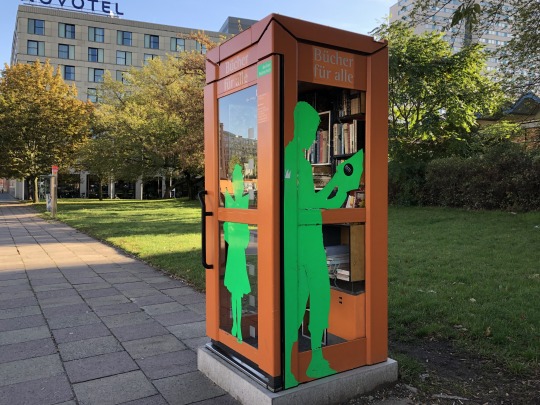
I caught the train to Bernauer Strabe. I wanted to go to a flea market, seeing it was Sunday, and Berlin has a lot but decided on this area as it also has a lot of Berlin Wall history. I have been here before but it’s five years so good to revisit the area. Next to the station you can see on the wall the famous photo of an East German soldier jumping through the barbed wire in the early days of the wall to escape. Police were waiting with a car to whisk him away to safety.

As soon as you coming out of the station there are posters about the Wall as this street seemed to be where a lot of people died and events happened more than other areas. The reason being is the wall went through people’s homes basically and at first people were fleeing out their front doors, then when they were blocked out their windows and even jumping out their windows.
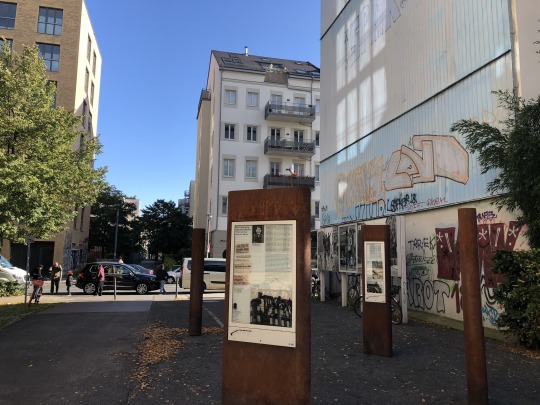
The Wall cut neighbourhoods in half and even families. Before the wall got so high people would stand on ladders so see their friends and families on the other side.
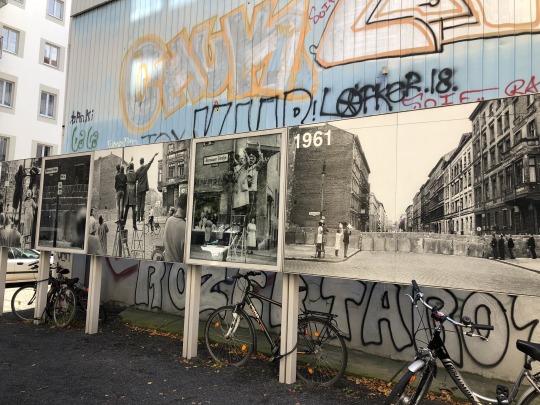
Each death remembered has a sad story behind it. This lady, Olga, was a 80 year old woman. Her daughter had got out of the home but not her mother. The people below convinced her to jump. The fire bridge had catching sheets for people who jumped. Olga jumped but hurt herself and died the next day in hospital. Memorials were built at the time for those who died but now she is remembered by this stone on the footpath.

Just along on this street was a huge flea market.

Me in my element.

Lots and lots of boxes of stuff.
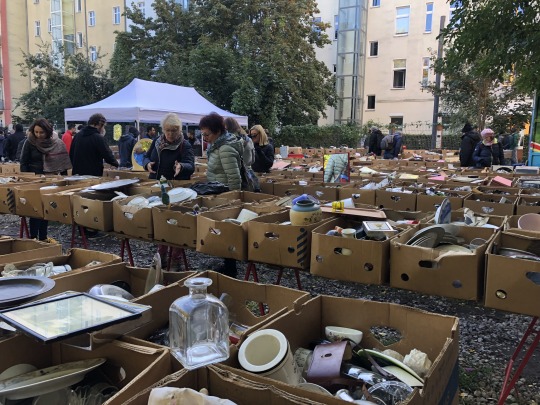
A few years ago it would have been a goldmine but now I’ve moved on from china. There was so much pink and white English china there. I would have been in seventh heaven.

I only ended up spending €3.50.

Back along the street to where all the Berlin Wall information was. I liked this art. I interpret it as the knife, or wall, cutting through the heart of people during 1961 to 1989. It could be something completely different.

Part of the original wall and where some is missing rusted poles are placed. The green grass was where the death strip was located as by the end there were two walls with a strip with guardhouses all the way along.

These are some of the people who lost their lives trying to escape from the East.

This area is a considerable section of wall.

An original guard house within the two walls.

I caught a tram back to Alexander Platz where some Octoberfest activities were going on.

Typical German biscuits.

Colourful stalls.

Lots of German food.

A bit later on I was joining an ‘Alternative’ free walking tour starting at the base of the communication tower.

Our first example of street art is done by a group and they put this all over the city. It’s 1UP. It’s from a Mario game. Berlin has a lot of graffiti which I’m not into but it was interesting getting the back story. I do like street art, though.

This is one of El Bocho’s work. El Bocho is a Berlin-based street artist using graphic posters to tell stories throughout the city, and across the world. One of his most recognisable series features the twisted character, Little Lucy, who became famous on the streets of Berlin as the imaginary little girl intent on killing her cat. In this one Little Lucy has a mouse to lure the cat and ‘gift’ in German is poison.
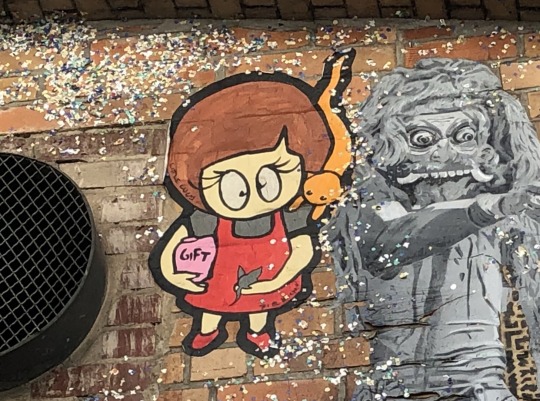
These paper cuts outs were interesting. Berlin has a huge techno dance music scene with a lot of clubs where people go. No one is allowed to take photos inside and it’s policed very thoroughly. However, this artist took some photos of just random people and put them up on walls. It could be anyone and in these clubs anything goes.
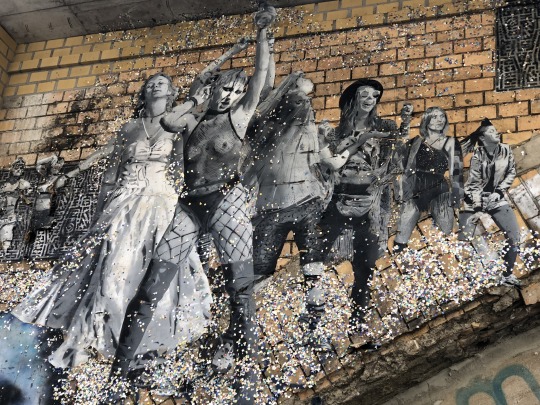
This was our guide who was very knowledgeable and full of information. These cards were done by a French artist and this type of art takes a long time and is fairly unique. It’s in the vain of Banksy. It is Angela Merkle as the Queen of Hearts.
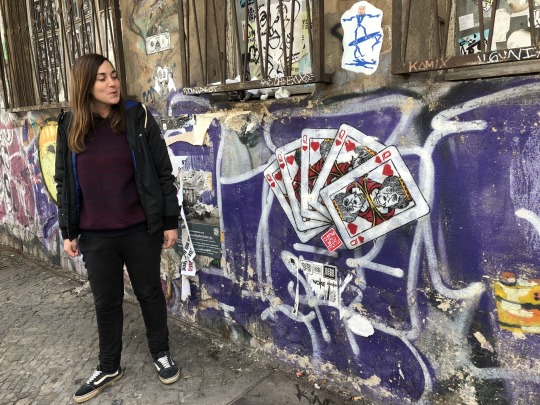
We turned off the street where there were some ‘stumbling stones’. This used to be a Jewish area. This family all died in Auschwitz.
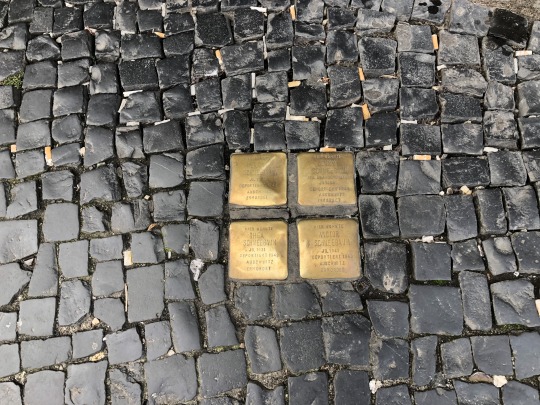
Immediately as you turned into the courtyard it was a great space. I like that rustic look. Now there are bars and cafes in where people used to live.
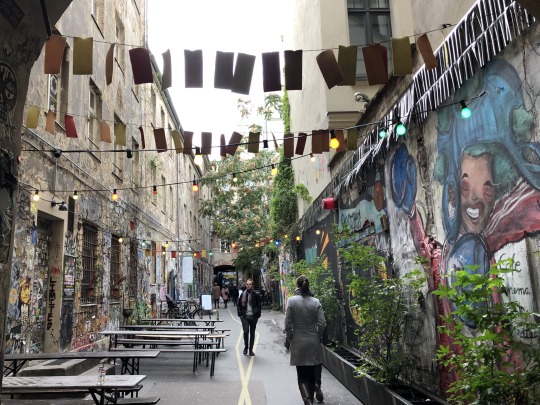
This man used to have a workshop here during WWII. He was able to hide some Jews with the help of a friend who was a prostitute and knew people in the underworld who could get more ration cards to feed those who were hiding. Another museum to visit next time,
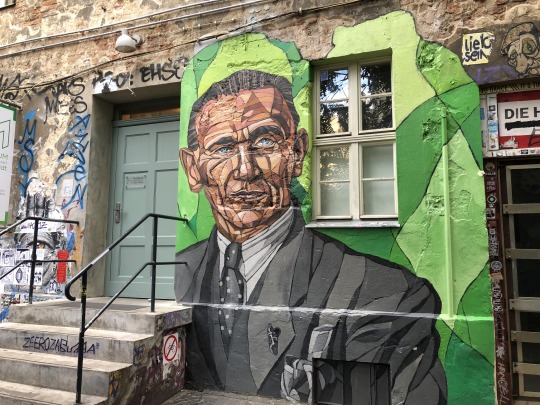
Looking back out to the street. Along the wall is street art that changes frequently. There is someone who oks what is to be on the walls.

Another quaint area.

I like this whole courtyard and nooks and crannies. Not sure who the painting is of.
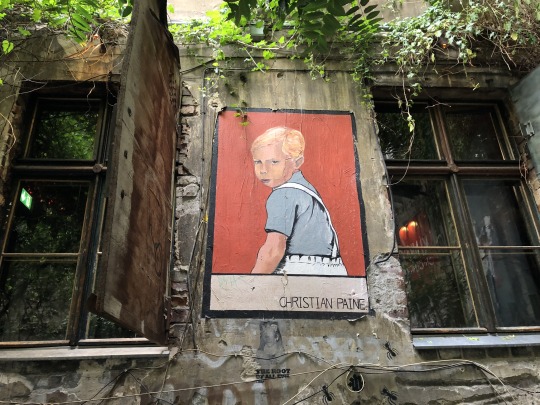
There was a museum about Anne Franks and other Jewish stories. That will have to wait for another time. The portrait of her was good.

Also in the courtyards were a couple of other Little Lucy. This one she has made a swing out of the cat.

Little Lucy has a gun here for the cat. All a bit warped but interesting to find as you are walking the streets.
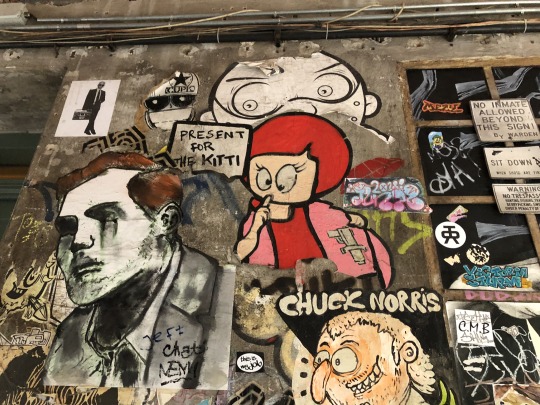
Next we caught the S bahn to Kottbusser which now is quite close to the centre of Berlin but in the 70′s it was fairly empty and on the outskirts. At that time Germany was in need of workers so they put the word out to countries and the biggest number of men came from Turkey. They settled in this area. They were only supposed to come for a year or two earn some good money then go back to Turkey. That didn’t happen and they stayed and bought their families over. Now this area has Turkish shops, bank, travel agent and mosque. However, the area is going through a gentrification process which is changing the area again. Germans are a country of renters and there are strict rules about rents etc so it’s difficult to force people to move. With shops it’s easier as rents can be put up.

This area has always been fairly politically active and to the Left so different changes have been fought over and stopped.

The Cosmonaut Mural was painted in 2007 by Victor Ash and is considered to be the largest stencil drawing in the world. Like much of Ash’s work the Cosmonaut explores contrasts between the subject matter and the environment that it inhabits. The unexpected sight of an unmissable, massive, weightless astronaut immediately leaves a lasting impression on pedestrians. Ash was born in Portugal in 1968 and raised in France. He currently lives and works in Copenhagen, Denmark.
The red and blue symbols are done by another group in Berlin more recently who abseil down buildings to do their paintings. They film themselves and put it on utube.

This used to be a hospital but when built the Emperor at the time was very much into liking church architecture. Now it’s a cultural centre.

This green strip,now park area, was once the ‘‘death Strip’ in the middle of the Berlin Wall. All over the city you can see where the wall was built.

We walked back to the river. All the way along you can see new buildings been built. Unlike Germany Berlin is not a wealthy city as it doesn’t have industry like the west of Germany does. As one gay Mayor said ’we might be poor but Berlin is sexy’. The city has a slightly alternative feel to it but like everywhere more money is coming in and new buildings built changing the scene. Below the construction is an area called YAMM which was built on a disused area. It’s full of bars and has an African lean. There are other places like this further along the river and in other disused train sheds etc but eventually development will push them out.
The tour finished at this point. A fabulous wander through the streets of Berlin.

I called in to have a look at YAMM. It was a pretty friendly place

The music was good and you could get up and dance if you wanted to. I declined but was happy to watch.

It had been a long day and getting very cold so that was pretty much me done. Ready for more adventures tomorrow.
2 notes
·
View notes
Text
David Bowie (Pt. 2)
“There’s old wave. There’s new wave. And then there’s David Bowie.” [1]

After his brief foray into “plastic soul” with 1975’s Young Americans, Bowie released Station to Station— the first in a string of albums heavily influenced by both contemporary German musical artists like Kraftwerk and Neu!, often referred to as krautrock, and German philosophers like Friedrich Nietzsche. [2] Bowie was no stranger to philosophical references in his work, having previously referenced Nietzsche’s works with “Oh! You Pretty Things,” “Quicksand,” and “Supermen,” all off of 1971’s Hunky Dory. [2, 3]
Station to Station introduced the Thin White Duke persona; a character he later referred to as “a nasty character for me.” It was during this era he made controversial comments referring to Hitler and had the infamous incident at Victoria Station that took what was meant as a wave at the gathered crowd and alleged it to instead be a Nazi salute. He had also been detained in Poland for having Nazi paraphernalia. [4]
Having picked up Iggy Pop on his Isolar Tour, David took a short break from producing his own music to help Pop produce his first solo album The Idiot (1977) and to an extent workshop the new sound he had wanted to explore. They headed to Switzerland to create the album with Iggy often “scribbling lyrics” while David and the other musicians worked at crafting the sound of the album. [1]
For Bowie’s next album, he picked up frequent collaborator and producer Tony Visconti as well as newcomer Brian Eno to work on the first of what would become known as the “Berlin Trilogy” or the “Berlin Triptych” in Low (1977). Although known as part of the Berlin Trilogy, work on Low started at the same Swiss chalet that had seen the creation of The Idiot. The move was partly inspired by Bowie’s larger goal to get himself and his friend off of their respective drug addictions and largely to give them both a new mindset away from the fame, fans, and record labels they faced in either the US or the UK. After its completion, Bowie sent a copy of Low to Nicolas Roeg with a note stating “This is what I wanted to do for the soundtrack,” referring to The Man Who Fell to Earth, the film they had completed the previous year and for which Bowie had initially been promised he’d be able to write the soundtrack. [1]
The release of Low was delayed by Bowie’s record label RCA not caring for half the album being instrumentals and the critical reception — what little there was due to a lack of promotion — was mixed to the point that over the years, it was referred to as almost entirely negatively received upon release. [5]
Bowie’s next album, “Heroes” (1977) expanded on the themes explored in Low, distilling and blending them into the next phase of his career. Recorded at Hansa Studio, which overlooked the Berlin Wall, it loosely used the same format as Low with more accessible lyric songs on Side A and instrumentals making up the majority of the B side. Furthering the similarities, both albums featured use of the “cut-up technique” of writing in which an author takes a poem or written work and cuts it up, rearranging the pages to form an exquisite corpse. [1, 6] Where it differed was while Low’s lyrics were largely inspired by Bowie’s life and current troubles, “Heroes” was considered as a whole to be a less personally inspired project and heavily informed by the culture, history, and “essence” of Berlin. [1]
Bowie continued his experiments not only with sound techniques, but recording and writing styles with the final album in the Berlin Trilogy, Lodger (1979). In writing it, he used techniques such as having his band switch instruments to create a more “garage band” “just learning their instruments” feel for “Boys Keep Swinging,” playing chords from “All The Young Dudes” backwards to create new song “Move On,” reusing the musical track from Iggy Pop’s Sister Midnight, from Bowie-produced The Idiot for “Red Money,” and taking further inspiration from producer Brian Eno’s Oblique Strategies cards, which Eno had introduced while he, Bowie, and Visconti worked on “Heroes.” [1]
Going into the 80s, Bowie was determined to have a hit record. [5] Despite previous fame and relative successes, Bowie wanted to not just be a hit artist; he wanted to be the hit artist. And with his divorce from Angela and his split from MainMan officially finalized, now was the time. The next album, Scary Monsters (and Super Creeps) (1980), reached #1 on the UK charts going platinum [7] and #12 in the US. [8]
The follow up three years later, Let’s Dance (1983) outdid its predecessor, both reaching #1 in the charts and going platinum in both countries. [7, 9, 10] The supporting tour, the Serious Moonlight Tour had the distinction of selling out every one of the 96 shows and being one of the largest shows of the time. [11]
The two subsequent albums Tonight (1984) and Never Let Me Down (1987), offered diminishing returns in terms of chart performance [12, 13] and critical reception, with Bowie later disowning Never Let Me Down saying in 1995 “My nadir was Never Let Me Down. It was such an awful album. … I really shouldn’t have even bothered going into the studio to record it. In fact, when I play it, I wonder if I did sometimes” [13] and later in 2002 “There was a period when I was performing in front of these huge stadium crowds and at that time I was thinking 'what are these people doing here? Why did they come to see me? They should be seeing Phil Collins'…And then that came back at me and I thought 'What am I doing here?” [14]
In 1987, as part of the Glass Spider Tour, Bowie had one of the most profound experiences of his touring career while playing a stage that butted up to the Berlin Wall. The sound from the fans on the East side singing along was so loud that Bowie could hear it about the din of his own concert. Part of the concert lives on on YouTube as well as a clip of David’s speech in German addressing both sides of the Wall. The influence of this show was acknowledged by the German Foreign Office in 2016 after Bowie’s death with a tweet reading “Good-bye, David Bowie. You are now among #Heroes. Thank you for helping to bring down the #wall” and linking to a live performance of David performing the song. [15]
As the 80s came to a close, Bowie chose to take some time away from his solo career and formed the band Tin Machine with Reeves Gabrels, and the brothers Hunt and Tony Sales.
He married his second wife, Somali supermodel, philanthropist, and entrepreneur Iman, twice in 1992; the first in a private ceremony and the second in a lavish ceremony in Tuscany. According to David, he was already naming their future children the night he met her. [16] His next album Black Tie, White Noise (1993) was as much a wedding album as it was a reflection of the things currently going on in his life from being in LA when the Rodney King riots started to the death of his beloved half-brother Terry and was a distinct return to “eclecticism” over marketability. [17]
The nineties continued the theme of “eclecticism” with 1995’s Outside, an exploration into the budding industrial movement framed by a murder mystery in support of which he toured with alterative/industrial band Nine Inch Nails [18], 1997’s Earthling, which examined electronic music, and 1999’s hours… which while more conventionally mainstream than its two predecessors in tone, was less well received. [19]
Between albums, Bowie was expanding his horizons beyond his music and film careers such as 1997’s release of Bowie Bonds, an early return for him on future earnings that was presented as an opportunity for the bearer to receive a 7.9% return on their investment [20]; BowieNet, a dial-up internet service provider that also gave subscribers exclusive content and a BowieNet email address [21]; and Omikron: The Nomadic Soul, a futuristic video game that featured songs from ‘hours…’ and featured David and Iman’s voices and likenesses. [22]
Bowie also had started work on Toy which would become his first unreleased album since The Man Who Fell to Earth soundtrack had been scuttled in the mid-70s. Some of the tracks from Toy ended up on his next album, 2002’s Heathen. [23]
His last album before taking a ten year hiatus was Reality (2003) During the supporting tour, he had a lollipop thrown in his eye, (later memorialized in a self portrait) [24], and had the heart attack that stopped him from touring his own music outside of occasional guest appearances with other artists such as David Gilmour of Pink Floyd and at events such as Fashion Rocks in the US. His last live performance was at a benefit for Alicia Keys’ Keep a Child Alive campaign where the pair sang a duet of Bowie’s song “Changes.” [25]
In 2013, he ended his hiatus with the unexpected release of The Next Day, the cover art for which featured a large white box overtop of the iconic “Heroes” album cover. The same year, he partnered with the Victoria and Albert museum in London to exhibit the David Bowie Is collection that later that year began a world tour with stops in Chicago, Paris, the Netherlands, Melbourne, and ending at the Brooklyn Museum on July 15th. [26] A digitized version of the collection became viewable on January 8th 2019 with the David Bowie Is app with narration by Gary Oldman. [27]
Despite the album reaching #2 on the US charts [28] and #1 in the UK [29], producer Tony Visconti said that Bowie had no intention of touring the album [30], a comment that music magazine Pitchfork chose to run with to mean that Bowie would never tour again. [31] Regardless of the intent of the statement, Pitchfork ended up being correct in saying the Bowie would never tour again.
In 2017, Bowie’s long standing ambition of writing a musical was realized when Lazarus opened in New York. Following what happens after The Man Who Fell to Earth, the plot sees lead character Thomas Jerome Newton in the modern day having not significantly aged since the events of the original story. Its composition took inspiration more the original novel by Walter Tevis than from Bowie’s role in the 1976 film. [32]
Bowie’s last album was released January 8th 2016, two days before his death from terminal liver cancer. ★, pronounced “Blackstar” incorporated some of the new songs Bowie had written for Lazarus with originals. Recent successes, past fame, and his very current death made sure that Blackstar placed #1 in 24 different countries including the US, UK, and Germany. [33]
After his death, Bowie was honoured not only with fan memorials and tributes, but with official plaques in Berlin and around England noting places of “historic significance.” [34, 35]
[1] Bowie in Berlin by Thomas Jerome Seabrook. 2008.
[2] David Bowie and Philosophy by Theodore G. Ammon. 2016.
[3] http://loudwire.com/songs-inspired-by-german-philosopher-nietzsche/
[4] https://www.thedailybeast.com/on-race-david-bowie-delved-deep-into-the-darkness-and-came-back-human
[5] Starman by Paul Trunka. 2011. Advanced Galley.
[6] https://www.theguardian.com/books/booksblog/2010/apr/13/construct-exquisite-corpse
[7] http://www.bowiewonderworld.com/faq.htm#m09a
[8] https://www.davidbowie.com/blog/2017/9/24/anciant-album-focus-scary-monsters
[9] https://www.riaa.com/gold-platinum/?tab_active=default-award&se=david+bowie#search_section
[10] https://www.billboard.com/articles/columns/chart-beat/8457017/david-bowie-no-1-hot-100-1983-chart-rewind
[11] http://www.electricmud.ca/2018/david-bowie-toronto1983/
[12] https://www.billboard.com/music/david-bowie/chart-history/billboard-200
[13] https://www.rollingstone.com/music/music-features/how-david-bowies-biggest-disappointment-became-a-posthumous-reworked-album-702189/
[14] David Bowie interviewed on Jonathan Ross, June 29th, 2002.
[15] https://twitter.com/GermanyDiplo/status/686498183669743616
[16] http://ultimateclassicrock.com/david-bowie-black-tie-white-noise/
[17] http://ultimateclassicrock.com/david-bowie-black-tie-white-noise/
[18] https://www.revolvermag.com/music/see-david-bowie-sing-hurt-nine-inch-nails-1995
[19] https://pitchfork.com/reviews/albums/881-hours/
[20] https://web.archive.org/web/20130620051917/http://www.commodityonline.com/news/david-bowie-bonds--ip-securitization-1896-3-1897.html
[21] https://www.theguardian.com/technology/2016/jan/11/david-bowie-bowienet-isp-internet
[22] https://www.polygon.com/2016/1/11/10749686/david-bowie-omikron-nomad-soul-david-cage
[23] http://www.davidbowieworld.nl/mijn-bootlegs-2-2/bbc/attachment/david-bowie-toy/
[24] https://twitter.com/dark_shark/status/692853482512977921?lang=en
[25] https://www.rollingstone.com/culture/culture-news/inside-david-bowies-final-years-237314/
[26] https://www.brooklynmuseum.org/exhibitions/davidbowieis
[27] https://www.davidbowie.com/blog/2019/1/8/david-bowie-is-virtual-launched-today
[28] https://www.billboard.com/music/david-bowie/chart-history/billboard-200/song/775880
[29] http://www.bowiewonderworld.com/features/thenextdaycharts.htm
[30] https://www.spin.com/2013/01/david-bowie-producer-the-next-day-album-details/
[31] https://twitter.com/Tonuspomus/status/289810690338856960
[32] https://lazarusmusical.com/about
[33] http://www.bowiewonderworld.com/features/blackstarcharts.htm
[34] https://www.theguardian.com/music/2016/aug/22/david-bowie-berlin-plaque-commemorates-singers-time-in-city
[35]
https://www.theguardian.com/music/2017/jun/15/david-bowie-three-blue-plaques-bbc-music-day
General Resources:
https://www.davidbowie.com/about/
8 notes
·
View notes
Text
Portraits Without Frames by Lev Ozerov

VARLAM TIKHONOVICH SHALAMOV
Forward and to one side, like a knight on a chessboard, with a knapsack on his back, Varlam Shalamov plods on, battered by Kolyma. Lonely, almost sullen, he has the air of a sad Russian peasant, or scholar, or writer whom life has stung hard, whom life has pressed down on but not yet utterly crushed. Deep in his soul there is still strength, still the will to fight fate. His wrinkled face is a hieroglyph of all he has lived through and does not speak about. It’s a cold day. We go into a café. Not much to eat there, but at least it’s warm. “Varlam Tikhonovich, read me some new poems.” He turns one ear towards me. Without a word he takes off his rough, wind-battered knapsack. Inside it, a wooden spoon hobnobs with crusts of bread, notebooks, and documents— death, after all, can creep up on you any moment. He reads slowly, separating each word: each word ready to drop into the abyss. Getting the words out is easier with pauses for breath. “Thank you,” I say. “No, it’s for me to thank you. Who nowadays asks anyone to read poems?” he says hoarsely, with feeling. “I’ve got an awful lot of them. How am I to choose?” He reads at random jumping from page to page, whatever catches his eye. Reading aloud, he warms up. “All right. Enough of that.” Someone brings coffee, sausages, bread. Steam rises from our cups; steam rises from our plates: the renowned fragrance of a Moscow people’s café. Shalamov tries not to eat too quickly, not to show that he is very hungry. I don’t ask about Kolyma, and he doesn’t mention it: as if it hadn’t happened. As he eats the bread, he holds one hand just below his chin. Crumbs fall into his palm. Shalamov eats them greedily, with particular relish. His long experience of malnutrition is apparent. This mouth accustomed to hunger opens slowly, mistrustfully, almost unwillingly, as if in shame. Shalamov eats in silence, with tried and tested deliberateness, with meaning, with pauses, and to me he seems not to be thinking about food. What is Shalamov thinking about? How am I to know? He returns his notebook to his knapsack. Out we both go into the winter outside “It’s a cold day,” I say. “What do you mean?” he says. “It’s warm.”
***
MIKHAIL ZOSHCHENKO (excerpt)
How does it start— the mad day, the made life of a writer? What whim, what overwhelming force presses a pen into some poor fellow’s hand and leads him down through all of Dante’s twisting circles?
***
PERETZ MARKISH
Once you’d seen him, you could say you’d seen Byron: honor, dignity, stature, a melancholy beauty. He’d raise his head and, with half-closed eyes, recite his poems as if he were singing. He wrote his own Childe Harold, his own Don Juan, his own Beppo. His sin, his one and only sin: that he wrote in Yiddish. He could express himself only in Yiddish. He could express himself only in Yiddish. For this, he was jailed. For this alone, executed. Everyone knew, but it wasn’t done to say it out loud, to spell it out in black and white. It was said and written: He died. Just went and died. Just went and died, you see. Why get people upset?
In the province we call Volhynia lies a village we call Polonne. That’s his childhood, that’s his grandfather Shimshon-Ber, that’s his cheder. And after that, he was chorister, tutor, day laborer, worker at the vineyards, army private, and office clerk. But he didn’t like calculating, he liked the immeasurable; on the flip side of banking documents poems began to appear. This dreamer’s distant gaze was focused not on the faces of clients but on the Galaxy. Later, he said in passing, “While you clutch a grass-blade, I hold up the Earth, the planet vast and blue. Immensity is what attracts me, but your grass-blade is a part of it too.”
We didn’t see each other for a long time. Then I saw him on a canvas by Alexander Labas. There, there he is— Markish, who was built for a long life, imagining his last hour. There is a touch of sunset in the dawn blaze. The light melts into a dark that allows no return.
His widow is making inquiries about her husband, about his notebooks and manuscripts, confiscated when he was arrested. His widow walks down the long corridors of the seventh floor— corridors her soul had walked long before. She had endured much: a waiting room, a small window where relatives could hand in parcels of food and clothes for a prisoner. But now she is here by invitation. Courteous and charming, General Borisoglebsky addresses her: “You can probably guess why I’ve called you here.” “No. Tell me.” “I am able to inform you that your husband has been rehabilitated.” “Where is he?” The general’s reply is ready and waiting, planed and polished: “He was executed by enemies of the people.” And he offers Markish’s widow a glass of water, also ready and waiting. “I want to read his case file.” “But you are not a lawyer.” “Where is my husband’s grave?” “He has none. . .”
More time passed. Another telephone call: “This is the KGB, finance department. It seems we owe you a little money.” “What do you mean? You’ve already returned me the money I tried to send to my husband but which he never received.” Pause. An in-breath. An out-breath. “We owe you for the teeth.” “What teeth?” “The gold crowns.” In a voice not her own, the widow let out a wild scream. Neighbors ran out into the hallway and caught her, as she collapsed in a faint. She was pale now and silent. While the telephone receiver on its twisted cord groped the wall, swinging like a pendulum, counting off our godforsaken time.
***
ARAM ILYICH KHACHATURIAN
Free time for whims is what makes age alluring; the aging Khachaturian grew to like touring: Rome—Paris—London—Berlin. He conducted, shook hands, represented the state, gave many an interview, enjoyed his fame through and through. Glory, after all is glorious; he lapped up bravos; the glitter of concert halls held him in thrall. Glad of each chance to further his own fame, he paid his respects to the pope and von Karajan, Stravinsky and Britten, the Dalai Lama, the Queen. He was photographed with them, or rather—they with him. Some photos were like ads, others more personal. Best of all were the snapshots of handshakes: hands coupled, heads bent forward. In his Moscow apartment, with its sliding doors, he treated guests to Armenian wine, Mutakh cheese, a few grapes, and these photos— expecting rapt exclamations. His albums, his apartment walls were adorned with every major celebrity. The only one missing was Salvador Dalí. He must visit Dalí! Must see Dalí! Must be photographed with Dalí! Otherwise both the collection and his own fame would be incomplete. Dalí gave his consent. A date was set for a meeting in a remote castle, At the time agreed, Khachaturian and his assistant, his assistant’s assistant, and his photographer, a friend and this friend’s daughter— a budding artist— approached the castle. A truly ancient castle! But in order to enter it you had to cross a wide swath of swampland. No other way: no footbridges, no guards to assist them. Mud splattered their dress shoes and best clothing; dispirited and exhausted, they crossed the swamp. The gates clanged open; they entered the empty vastness of the ancient castle, akin to a planetarium or crematorium. The silence continued. The guests stood in a stupor. This was insane! Suddenly, in all its wild frenzy, the “Sabre Dance” was unleashed. It was like bolts of lightning! Crossed sabres rang out struck each other, recoiled, parted, flashed again, clanged again. It was spectacular! The music’s proud composer managed a smile: this was, after all, in his honor. He was distracted, however, by the sight of his Angelo Litrico shoes, gleaming new only the day before but now encrusted with mud. The “Sabre Dance” drew to an end. After a meaningful pause, Salvador Dalí himself appeared, riding a dark horse, dressed like Don Quixote, carrying a spear, of course, but without Sancho Panza. He rode three victory laps, respectfully stopping beside his shivering guests. Through half-closed eyes he looked down at everyone with benevolent condescension: a look full of meaning. Then, thrice brandishing his spear, he withdrew so abruptly that the photographer was unable to recollect what he was meant to be doing there. A prerecorded message boomed a polite “Arrivederci”; the lights went out, the wayfarers exited. “Ouch!” groaned the photographer. “Argh!” growled the assistant. Khachaturian stayed silent. Once again they trudged through the surrounding mud, but I said enough about that as I described their approach to the castle of the ingenious Salvador.
It is said that this episode cooled the composer’s ardor: he went less often on tour to dodgy venues.
1 note
·
View note
Photo

ESCAPAR
Summary: AU | Raquel decides to stay with Sergio instead of visiting Angel in the hospital, afraid she will get arrested in the process. So she ends up escaping with the gang and has to learn how to live as a fugitive. [AO3] [spirit]
Chapter 8 - Nonna
They spent other fifteen days in Switzerland until Sergio finished all the business and made sure they were completely safe out of the country. Raquel wanted to go early, bargained as much as she could, even suggested they’d go with her annoying bodyguard stuck with them, but in the end, she was left with count the days in front of the TV in the living room, watching as the world would continue to spin.
Madrid remained in the same chaos. Protests exploded everywhere, and although the people with Dalí masks in the streets hailed the bravery and audacity of the thieves as superheroes, they only seemed to instigate the police even more, who were constantly making search operations as a witch hunt. Raquel heard her name repeatedly in the mouths of several reporters, some defending her and others doubting her innocence as the last hostage of the heist. Sergio’s face appeared several times as well, and Raquel watched the video of herself kick in his arms at the port of Madrid on repeat until she couldn’t stand it anymore and turned off the TV.
Maybe that's why she decided to carry the concealed black pistol with her on the trip, even if she had promised no guns. Feeling it full with ammunition in the holster under her skirt brought a twisted feeling of security, and Raquel concluded that no one is entirely safe when hiding from the police. She didn’t show it, but she was electric, fully on alert. Her police senses were constantly on since they left the apartment and took a clandestine plane that would take them to Italy.
Sergio's hands was also sweaty on the wheel of the gray BMW, indicating his nervousness, but for a completely different reason: the encounter between Raquel and his grandmother. He drove slowly, almost below the speed limit of the deserted road, and feeling stupid for letting something as silly as Raquel meeting what was left of his family make him so apprehensive.
It's not that he didn’t trust Raquel with this information: his confidence skills improved a lot after they talked about what happened on the port. It was Nonna he did not trust. The old lady was very sweet, affectionate and protective, but could be a hell on earth if you mess with her family. And his relationship with Raquel was new and still complicated, full of mood swings and unfilled gaps. Sergio did not want to scare her or let her down when everything seemed to get better.
"Hey," Raquel whispered softly resting her hand on his leg. "I know you're worried. I need to admit I'm also not completely relaxed about this, but it's going to be ok!" "Yes, of course it will," he said and forced a smile. "I just... I never introduced anyone to my grandmother, I'm not used to… dealing with that kind of situation." Raquel laughed sweetly and came closer to give him a soft kiss on his cheek. "I can’t believe you’re more nervous because I’m meeting your grandma than with the fact that we’re fugitives?"
"Well, you are not a fugitive, you are my hostage. But yes, there is also that," Sergio laughed along adjusting the glasses on his nose, then turned the wheel around with a curve of the road. "The truth is, I didn’t have as many relationships in my life like you did. None, to be specific. And I’m used to be prepare for everything but this is still unknown territory to me" "Well, no one is fully prepared to meet their in-laws. And our troubled relationship doesn’t make things any easier” she smiled sweetly and turned her gaze to the road, now adorned with a breathtaking green landscape view. "Think of it as a simple dinner with special people. What’s the worst that could happen?”
***
Raquel took Sergio's hand in silence, shortly after he pressed the bell of the house where his grandmother lived. The residence was the typical sweet fairytale house, directly coming out of a romcom set in Italy: it was on top of a low hill and far from any kind of civilization. The entrance path was framed by white wooden fence keeping a beautiful garden of red roses and the smell of fresh apple pie being cooked escaped through the half-open windows.
During the whole trip, the inspector didn’t think much about how she would be introduced, but a second before the door opened, Raquel felt scared of a rejection. She was surely far from being the princess any mother had dreamed of for her son, and for the first time she felt dislocated with her independent, strong and rebellious aesthetics. But the insecurity soon gave way to a larger feeling that filled her heart when she saw Sergio's eyes watering as he faced the small lady with white puffy hair who opened the door, looking suspicious.
"Hello Nonna," he said, and his voice was shaky. Nonna frowned her wrinkled eyes at Raquel first and then directed her eyes to hiim, opened them wide in surprise. "Sergio?" She called and a smile came to her lips. "Is that you?" "It's me" Sergio now cried and laughed at the same time and Raquel only let go of his squeezing hand when the professor hugged his grandmother.
It was such an important and delicate moment that Raquel’s heart grew three times in size when she saw him so happy. He was in the arms of the woman who raised him without asking for anything in return, who loved him as his son, and included him in the family even without any obligation to do so. Raquel thought of all the love her own mother felt for her, and how this love doubled in size and crosses through her body, involuntarily, when Paula was born, as if very thin imaginary lines connected all three women forever right there in the maternity hospital. The inspector smiled, seeing nonna hold Sergio's face the same way that Maribi used to do with her and saw the power of a mother's love washing over him.
"I thought you were in jail! Or worse, dead! So many things happened, the TV does not stop talking about you. Your brother …” Nonna started but stopped when Sergio nodded positively, closing his eyes.
As if the mentioning of Berlin was a trigger, Nonna suddenly felt Raquel’s presence by his side, shifting the weight of her body under her uncomfortable feet. She gave her a glare that went quickly from sadness to rage and soon to disgust and Raquel could not bear to stare back. She looked at her feet instead and played with her watchband hoping that awkward moment would be over soon.
"Nonna" Sergio cleared his throat and readjusted his posture "I assume you already know Raquel Murillo" "Sergio, my dear, I'm very happy that you came to visit me, I missed you so much! But I will not accept cops inside my house," she said firmly, almost outraged, resting her hands on her hips. "They're killers using guns and badges and they've destroyed our family, you know that."
"Grandma, listen to me, Raquel’s is different. We…" "Sergio, it's okay" Raquel interrupted softly "She has every right to ..." "No, she needs to know! She needs to know, Raquel, you said it yourself that she is a part of my story and I want to be able to share it with you too." Sergio put an awkward arm around Raquel's back, resting a cold hand on her waist, and stared at his grandma shocked gaze with his chin up.
"I love her, Nonna. I didn’t predict it, I didn’t plan it and maybe it was a mistake, but it happened. You've always taught me that we have to take responsibility for our mistakes so I'm doing it now. Raquel was the best mistake I've made so far and if she can’t hen I will not either."
Nonna was silent for a long time, alternating the look of judgment between her grandson and Raquel while the inspector stared at him in shock as well. Then the elderly straightened her posture and looked uncomfortable in the doorway, wiping her hands on the apron that covered the flanel dress.
"I thought your brother was the only stubborn rebel in this family, Sergio, but I assume you both got this behavior from your father…” she said at last, pursing her lips in frustration. Then she just turned around entering the house again “Alright. Take your shoes off before coming in, I just cleaned up. The lasagna will be ready soon.”
***
"It was delicious" Raquel dared to praise after a particularly quiet dinner. Sergio told his grandmother all the details of the robbery that didn’t pass on the TV, and she listened to it quietly, casting curious glances at them. She was a very suspicious lady, Raquel concluded, a typical Italian grandmother who, despite her age, had a talent for cooking and would protect her family tooth and nail if necessary.
"Thank you so much for the dinner, Mrs…?" she trailed off, glancing to Sergio and realizing that she had not remembered to ask his grandmother’s real name.
"Uhm ... Nonna doesn’t reveal her name to anyone" he whispered, adjusting his glasses and Raquel frowned. "Her husband was one of the leaders of the Italian resistance during the second world war. They had to adopt codenames so the Fascist government wouldn’t find them.”
Raquel studied the little old lady, eating another bite of lasagna, and thought of all that she had suffered in her life to keep her family alive and together. She had to bury not only her husband, but her children and one of her grandsons, and has to live alone isolated all those years where memories haunted her. Suddenly the house looked less like fairytales and more like a melancholic and painful place. The inspector looked around, at the countless family portraits resting on shelves of the wooden dining room, and couldn’t even imagine the whole story behind them.
"It must have been unbearably difficult," Raquel suggested.
“Well, it was Nonna who taught me Bella Ciao when I was little. During the robbery I tried to teach the lyrics to the gang as a motivation..." Sergio added, trying to shift the mood and Nonna opened the first smile of the evening. “I’m not quite sure if they got the message of the song, though”
“I’m not surprised if they didn't. You only know the true meaning of war if you are in one” Nonna looked wisely, and Raquel noticed a few similarities with Sergio in the way she talked. “But I’m proud of you, for honoring it”
"You are a very strong woman, Nonna, it’s quite admirable.” the inspector smiled, searching for the right words as if she was stepping in eggs “And, about earlier, I understood your reaction, you were completely entitled to it. But, if I must say, I don’t think I want to be a member of the police force anymore”
Nonna stopped with her fork halfway through her mouth and Sergio immediately looked at Raquel with a confused expression. She simply ignored him and continued.
"After what happened during the heist, I found out that I don’t agree with some principles of being an inspector, especially regarding the national security service of Spain..." she looked at her empty plate and felt nauseous when she remembering all the many occasions she felt humiliated by Colonel Prieto, by her ex-husband, or by any other man that believed to be better than her was just because was born with the XY chromosomes. "They believe everything is in black and white. But some things are... in shades of gray"
When Raquel finally met the professor's gaze, she saw a whole universe in his eyes and vaguely remembered that Nonna stared at them from the other side of the table. He smiled and she softened, making her giggle as they touched their hands under the table like two teenagers in love.
"Well... I think we're done here." Nonna interrupted, resting the cutlery on the empty plate. "Honey, can you please wash the dishes? I want to have a private conversation with the inspector"
Raquel inhaled slowly and Sergio nodded in silence. He picked up the dirty dishes and exchanged a brief worried glance with her before retiring to the kitchen. Nonna got out of her chair, with some difficulty due to age, as soon as he was out of sight.
"You know I don’t usually look for news of what is happening in Spain, I only see what they say in the local newspaper here.” she said, circling the table slowly and Raquel didn’t know if she should get up to help her. "But I mean the whole world when I say that the newspapers have a lot to say about you, young lady"
"I know," she said, feeling defeated and ashamed somehow.
"For a long time, I agreed and disagreed with much of what the journalists said. I thought you only wanted the harm of my grandson. But today, I saw the way he looks at you and how you look at him, and I realized that it does not matter what I think.” Nonna opened the cupboard behind Raquel where she supposed there would be plates and cutlery but instead she found books and records.
“I mean, I just an old lonely lady, who am I to judge?” “You are very special to him, ma’m” Raquel smiled and got up to make room for the old woman to rummage inside the cupboard.
"When I was younger, I fell madly in love with a beautiful, intelligent, brave man who lived two houses after mine. We dated in secret for a long time because he was from a much poorer family than mine and it was outrageous if we were even seen together.” Nonna seemed to speak on her own, but Raquel partially identified herself with the story and wondered how much the newspapers had revealed about her relationship with Sergio.
“And when the war hit us, they called me crazy for giving up everything I had to escape with a revolutionary, futureless delinquent" Raquel watched the lady pull out a small green wooden box from the highest shelf and close the cupboard. She set the box on the dining table and opened it, containing: two cigars, some wrapped papers, two silver rings, and a necklace that caught Raquel's attention.
"When we ran away, Salvatore gave me this necklace as a gift," she said, pulling out the jewelry with shaking hands, and Raquel could see the pendant. It looked like a small cage meticulously carved in silver that nestled a light pink pearl inside.
"Salva..." she murmured to herself, raising her eyebrows as she understood Sergio's tribute to his grandfather. But Nonna couldn’t know that.
"Yes, well we never had codenames for each other. He was always my Salvatore" she smiled, spinning the pendant around her wrinkled fingers. "You see, every pearl when inside an oyster’s shell, has a different color shade. And people say that every color has it’s meaning, as a lucky charm. This one means love and I want you to have it."
Raquel's eyes widened, completely baffled. "No, no, no, it's a family treasure! I can’t..."
"Of course you can." Nonna grabbed her hand and put the necklace inside the palm before closing the inspector's fingers around it. "I may not agree with Sergio's choice, but it’s the one he did. Can’t come back from it now. And I support it, as long as he is happy... "
The lady released her hand and Raquel studied the jewelry more closely. It didn’t look very refined but it was beautiful. The loose pearl inside the silver arrangement gleamed in the light as if it was made with stardust and she felt she could break it with any more abrupt movement.
"Just don’t ruin everything, will you, dear?" Nonna asked, patting her on the shoulder and she felt she was about to cry. Raquel wanted to thank the elder for the gesture but when she looked up again, something caught her attention and the smile on her lips faded, being replaced by panting breathing and racing heartbeat.
Through the window behind Nonna, at the end of the night-drenched landscape, a red-and-blue siren glowed on the horizon.
#la casa de papel#money heist#raquel murillo#raquel y el profesor#raquel x profesor#raquel x sergio#raquel x professor#sergio marquina#iwritestuff#escapar
20 notes
·
View notes
Text
The Vulgar Boatmen interview- Dale Lawrence talks shop.
I had been thinking about sending some questions Dale Lawrence’s way ever since I’d heard the 2015 reissue of the band’s 1989 debut, You and Your Sister (reissued on Time Change Records out of Indianapolis). The band had formed in the late 80’s by two friends (well, sort of....see below) , Lawrence (who was based in Indiana ) and Robert Ray (who was based in Florida). Back then they did it the old fashioned way, by mailing cassettes back and forth (the only way) and that seemed to work just fine. It had been years since I’d heard that debut and the reissue reminded me of how great (and underappreciated) the band was. You’ll hear elements of The Feelies (those jangly guitars and even in the rhythms, too) but also other classic bands like the Velvet Underground and even the Everly Brothers on certain cuts. Their sophomore effort, 1992’s Please Panic was just as good (maybe better) and I never heard 1995’s Opposite Sex (I hope to change that very soon…both recently reissued, see below) and then the band broke up. If you’ve never heard the band’s music and have read this far then by all means do check them out, you won’t be sorry as their songs are truly excellent. Pop music with hooks and plenty of smarts. A month or so ago I sent some questions to Dale and he was more than happy to elaborate on my queries. Read on and when you have some time play “Drive Somewhere” at top volume today!
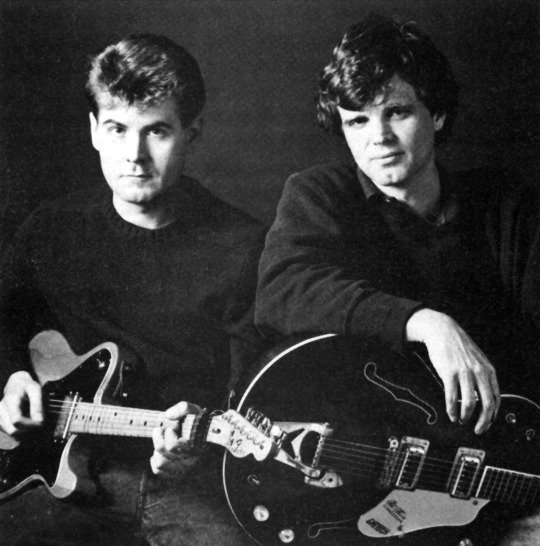
Robert and Dale, the early years.
Where were you born/where did you grow up?
I was born in Valparaiso, Indiana, and grew up one county over, on a farm outside a town called Hanna, an hour or so from Chicago.
Was your family musical or at least supportive of your musical pursuits?
Neither of my parents were especially musically inclined but I did grow up surrounded (and fascinated) by records. And my parents at least never tried to discourage my musical ambitions.
What was your first band you ever saw live?
I was very lucky -- Neil Young, the 1973 Stray Gators tour (which resulted in Time Fades Away).
What was your initial entry into the world of independent/punk/other music? (I know you were in The Gizmos…..that might need to be a whole other interview!!).
My rock ‘n’ roll life began when I was nine years old and suddenly noticed Top 40 radio on the bus ride home from school: WLS, out of Chicago, 1965, a very good year for radio. (Again, lucky.) By 1976/77, I was in college and listening to the usual suspects, Modern Lovers, Television, Ramones. But hearing the Sex Pistols in the fall of ’77 was really the big corner. It hit me like nothing else before or since, made the world seem like a wholly different place. The sound of those records, the sound of Johnny Rotten’s voice, sounded exactly how frustrating it felt to be alive just then. And it made me want to be in a band, an old ambition I’d largely abandoned as a pipedream. Within weeks, I'd answer an ad and join the Ted Neimeic Gizmos on rhythm guitar.
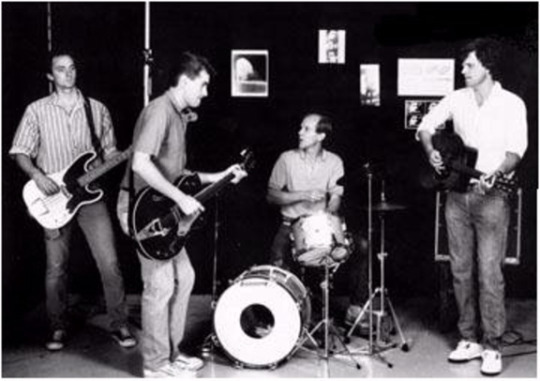
Ready to rock.
What were the beginnings of the Vulgar Boatmen?
The Boatmen actually began in Gainesville, Florida, a couple years before either Robert or I were involved. At that time it was a very different band, different aesthetic, different set of musicians (oddly enough, a situation pretty similar to the two different versions of Gizmos). Robert was friends with some of the band members and eventually joined, initially as rhythm guitarist. When the main songwriter, Walter Salas-Humara, left to form the Silos in New York, the Boatmen needed new material and started doing some of the songs I’d written in the Gizmos. Robert changed some lyrics, added a bridge or two – these were our first “collaborations.” I was in Indianapolis at that time, leading a band called Right to Left. It was then that Robert and I started collaborating in earnest, sending song ideas back and forth thru the mail.
Where did the band name come from?
The name was already in place when Robert and I got involved. It’s basically a third-graders pun on “The Volga Boatman,” a beginners piano piece. To the extent it doesn’t sound like we’re taking ourselves too seriously, I always liked the name. But we probably would have been smart to try to come up with something more fitting.
Were you and Robert always based in separate states or was there ever a time that you lived near each other?
There were a couple years when we both lived in Bloomington, while he was a grad student and I was an undergrad at Indiana University. We met, weirdly enough, in a class on song lyrics. Robert was the AI and when he mentioned in class that he’d seen Elvis perform in Memphis, pre-RCA, I immediately scheduled office hours with him and we’ve been great friends ever since. Neither of us were in bands at that time, though I'd be in the Gizmos within a few months. We didn’t start writing together until years later.
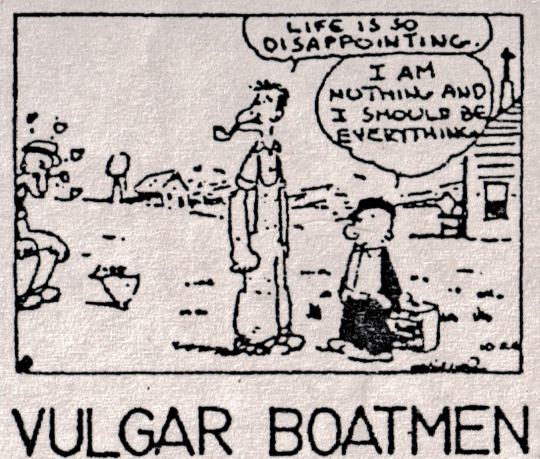
What do you remember most about working on the songs that would become You and Your Sister?
In terms of writing the songs, I remember consciously trying to use as few chords as possible (a lot fewer than I'd typically employed in Gizmos songs) -- and in particular, concentrating on the I and IV chords, a movement I could hear at the heart of so much music I loved, from the Soul Stirrers to "Road Runner." Also, I remember that having a fulltime songwriting partner was a distinct luxury: two sets of ears to hear rhythmic settings, better odds of finding the right lyrics.
Recording-wise, the album was done at Robert’s house, on an 8-track machine, so I remember hanging out there in Gainesville for weeks at a time. The relaxed schedule that arrangement afforded us might in hindsight be the most important element in the recording process. We could afford not to rush anything. If a vocal or a tempo or a guitar sound wasn’t quite there, we knew we had plenty of time to get it right. I especially remember obsessing over snare-drum sounds. One we were especially happy with was on “Mary Jane” – except that when we tried recording a lead vocal, we discovered that most of what we liked about the snare sound was actually on the scratch vocal track. So that scratch vocal ended up being the actual vocal.
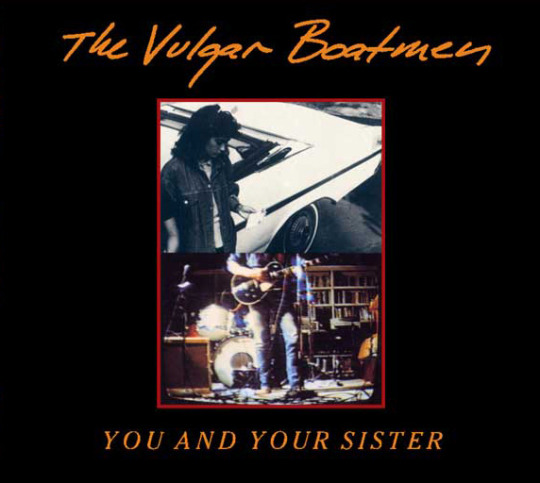
The classic album!
Did you tour much for the record? Ever make it overseas?
We did tour quite a bit for that album, several swings through the south and the east coast, once to the west coast. We did not make it overseas until the second and third albums, when we played Germany, Austria, and England.
At the time of You and Your Sister were you working regular jobs?
I was working for a local record store, traveling on weekends to collectors conventions, hawking bootleg videos – already a bit like touring. Robert had a full-fledged career, teaching at the University of Florida.
Was it basically the same lineup for 1992’s Please Panic?
Well, yes and no. Both albums were recorded by a combination of musicians from both the Gainesville and Indianapolis lineups. (So, for example, there are four different drummers on Sister.) The Indiana musicians used on the second album are mostly different than the ones who had contributed on the first, the Florida musicians were pretty much the same. One difference on the second album is that we had access to studio pro J.D. Foster, who is the main bass player on Please Panic.
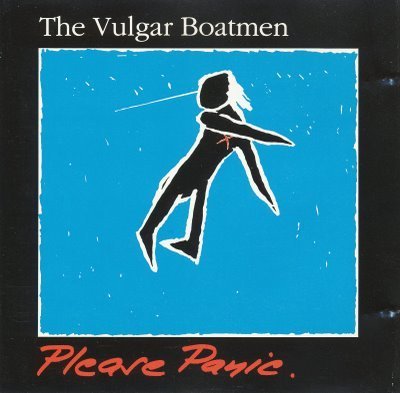
The other classic album!
How did the band end…..or did it not? The end for us came, as for many indie bands, when we signed with a major, Warners/EastWest, out of London. We finally had a bit of a budget to make a record and, at first, major promotional assistance. But a shakeup at Elektra resulted in Opposite Sex never seeing a US release, which was pretty much the end of the road. Our pending booking deal with Monterey Peninsula fell through and we were dropped almost immediately by the UK label as well. The band has never officially broken up, but it has become very much a part-time thing. The Indianapolis outfit plays out a handful of times every year.
I noticed that you still play live these days. Is it under your own name or the Vulgar Boatmen?
The Vulgar Boatmen.
What are your top 10 desert island discs? Portrait of the Artist as a Young Man, Louis Armstrong.
Never Mind the Bollocks Here’s the Sex Pistols.
The Complete Buddy Holly.
A Hard Day’s Night (or any of their first five albums), the Beatles.
Stranded (or Siren or Country Life), Roxy Music.
Ella Fitzgerald Sings the Rodgers and Hart Songbook.
The Sun Sessions, Elvis Presley.
Call Me, Al Green.
Astral Weeks, Van Morrison.
Bo Diddley (or The Duke at Fargo or The Definitive Otis Redding or...).
Some of your current favorite bands/musicians?
I listen to way more older music than current stuff, always finding records I hadn't known about before. Right now, I’m listening a lot to Jimmy Reed. Thelonious Monk has been a constant on my stereo in recent years. Two current bands I love are Terakaft and Sufjan Stevens.

A recent pic of the band.
Final words? Closing comments? Anything you want to add that I didn’t ask?
I guess I can plug some rereleases that are about to happen. The first three Boatmen albums are being reissued on vinyl, by Play Loud! Records, out of Berlin. As with the Sister CD, Please Panic has been completely remastered. It will be the first time that Opposite Sex has ever been out on vinyl.
Thanks so much for doing this!
Relevant links below!
www.facebook.com/airportdecisionsinc/
www.timechangerecords.com
www.playloud.org
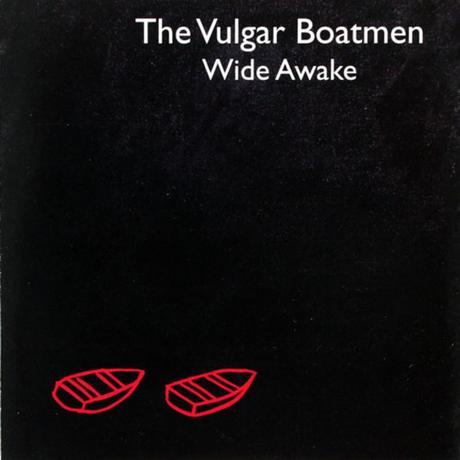
Their 1995 album.
youtube
Such a classic!
7 notes
·
View notes
Text
Album Of The Week: ‘Nashville Skyline’ by Bob Dylan
Stand Out Song: ‘Girl from the North Country’.
I can’t remember when I first saw the album cover for ‘Nashville Skyline’ but I know that everytime I look at it, it fills me with a great sense of warmth. Its one of those album covers that seems to have always been floating around my life. The album cover itself always makes me think of my Dad. As its Bob Dylan ofcourse it would as Dylan was his artist but theres more to this album cover than that. The guitar with its western flowers on it, the gentle blue sky behind Bob,his outfit and that smile all make me think of my Dad and the actual album that comes from the cover only makes that connection all the more stronger and all the more special.
‘Nashville Skyline’ for me signals a departure from the road that Dylan had been travelling on up to this point. When the album was released in 1969, Dylan was largely known for his often strikingly poignant lyrics that had featured on records such as ‘Bringing It All Back Home’ (1965) and ‘The Times They Are A-Changin’ (1964) to name but a couple. ‘Nashville Skyline’ is a step away from that and in a way signals the beginning of the end. Thats not strictly fair as Dylan did create some wonderful tracks beyond 1970 including some of his more recent work from the last few years however, none of them reached the heights of those albums that were rolling out in the 60s that helped to establish the reputation of one of America’s greatest song writers if not the greatest. With ‘Nashville Skyline’ Dylan began a trilogy that I like to refer to as the going up the country recordings. Like with Bowie’s Berlin trilogy, Dylan took a step away from his usual work and tried something a little different and for me it really works. In fact, this trilogy of albums that were released over the course of sixteen months are perhaps my favourites of Dylans. Now, thats a statement that can change depending on how I’m feeling on that particular day but there is something that draws me to these three albums that is so laid back and organic that you can’t help but fall into these records and be truly absorbed by them. ‘Nashville Skyline’ is the entryway into this journey that then sees us venture to my personal favourite ‘Self Portrait’ before four months later (Four. Months.) to ‘New Morning’. Its one thing to release three albums in such quick succession but the fact that they bare the quality that they do makes it all the more astounding.
Dylan’s voice on ‘Nashville Skyline’ is different. He sounds like a different artist. And in many ways, he is. He has taken a step away from the cities and the politics of the time and is instead roaming through the country lending his guitar more to love than war. ‘Nashville Skyline’ opens with ‘Girl From the North Country’ with Mr. Cash and it is so heart achingly beautiful. Its a song that doesn’t give you a choice of whether you’re listening to it or not and its a perfect track to open the album with. We are introduced to a different style of singing from Dylan but alongside the familiar Cash it works and it makes the adjustment all the more easier. The fact that its followed by the instrumental ’Nashville Skyline Rag’ again is a good choice as not only does it allow the experience of ‘Girl From the North Country’ the space to breath but again we are given the time to adjust to Dylan’s new style so by the time we reach ‘To Be Alone With You’ we’re onboard. ‘To Be Alone With You’ does sound a little bit more like a traditional Dylan song so its when we hit ‘I Threw It All Away’ that we really get into the swing of it. Here we’re really experiencing the love side of Dylan although once again it is through heartbreak. Thankfully though, the heartbreak eases somewhat with ‘Lay, Lady, Lay’ and by the time we reach the album’s end ‘Tonight I’ll Be Staying Here with You’ Dylan has done more than enough to get his listeners to buy into his brand of love songs and his new style in general. As I say, in my eyes ‘Nashville Skyline’ is the first in an unofficial trilogy and its quite a special first act to me. In part because Dylan sounds like he has found a new sense of peace on it and also because when I listen to it, like with all Dylan works, I feel a connection out across the Universe.
Tonight I’ll be staying here with you.
-Jake, a man taking his time, 28/02/2022
1 note
·
View note
Text
the best thing about Perry Anderson’s American Foreign Policy and Its Thinkers is all the opportunities he takes to dunk on George Kennan
In later years Kennan would represent his conception of containment as a political strategy of limited geographical application—not a call for worldwide armed activity, as charged by Lippmann, a rare early critic—and contrast it as a stance of prudent defence with the adventurist notions of ‘rollback’ advocated by Dulles, and ‘flexible response’ by Kennedy. Legend has since canonized the image of a sober adviser whose counsels of moderation and wisdom were distorted into a reckless anti-communist activism that would bring disasters against which he spoke out, remaining true to himself as a critic of American hubris and intransigence. The reality was otherwise. Unstable and excitable, Kennan lacked the steadiness of his friend and successor Nitze, but in his days of power in Washington was a Cold Warrior à l’outrance, setting the course for decades of global intervention and counter-revolution.
[In the extravagance of his fluctuations between elated self-regard and tortured self-flagellation—as in the volatility of his opinions: he would frequently say one thing and its opposite virtually overnight—Kennan was closer to a character out of Dostoevsky than any figure in Chekhov, with whom he claimed an affinity. His inconsistencies, which made it easier to portray him in retrospect as an oracle of temperate realism, were such that he could never be taken as a simple concentrate or archetype of the foreign-policy establishment that conducted America into the Cold War, his role as policy-maker in any case coming to an end in 1950. But just insofar as he has come to be represented as the sane keeper of the conscience of US foreign policy, his actual record—violent and erratic into his mid-seventies—serves as a marker of what could pass for a sense of proportion in the pursuit of the national interest. In the voluminous literature on Kennan, Stephanson’s study Kennan and the Art of Foreign Policy, Cambridge, MA 1989 stands out as the only serious examination of the intellectual substance of his writings, a courteous but devastating deconstruction of them. An acute, not unsympathetic, cultural-political portrait of him as a conservative out of his time is to be found in Harper’s American Visions of Europe, pp. 135–232. In later life, Kennan sought to cover his tracks in the period when he held a modicum of power, to protect his reputation and that of his slogan. We owe some striking pages to that impulse, so have no reason to complain, though also none to take his self-presentation at face value. His best writing was autobiographical and historical: vivid, if far from candid Memoirs—skirting suggestio falsi, rife with suppressio veri; desolate vignettes of the American scene in Sketches from a Life; and the late Decline of Bismarck’s European Order: Franco-Russian Relations 1875–1890, Princeton: Princeton University Press, 1979.]
At the outset of his career as a diplomat, [Kennan] had decided that the Bolsheviks were ‘a little group of spiteful Jewish parasites’, in their ‘innate cowardice’ and ‘intellectual insolence’ abandoning ‘the ship of Western European civilization like a swarm of rats’. There could be no compromise with them. Stationed in Prague during the Nazi takeover of Czechoslovakia, his first reaction was that Czechs counted German rule a blessing; later, touring occupied Poland—he was now en poste in Berlin—he felt Poles too might come to regard rule by Hans Frank as an improvement in their lot. When Hitler attacked the Soviet Union, he told his superiors that, from Scandinavia to the Black Sea, Russia was everywhere feared more than Germany, and must bear the ‘moral consequences’ of Operation Barbarossa alone, with ‘no claim on Western sympathies’.
[Under Nazi rule, ‘the Czechs enjoyed privileges and satisfaction in excess of anything they “dreamed of in Austrian days”’, and could ‘cheerfully align themselves with the single most dynamic movement in Europe’, as the best account of this phase in his career summarizes his opinion. In Poland, Kennan reported, ‘the hope of improved material conditions and of an efficient, orderly administration may be sufficient to exhaust the aspirations of a people whose political education has always been primitive’: see David Mayers, George Kennan and the Dilemmas of US Foreign Policy, New York: Oxford University Press, 1988, pp. 71–3. For Kennan’s letter on 24 June 1941, two days after the launching of Hitler’s attack on the USSR, described simply as ‘the German war effort’, see his Memoirs, 1925–1950, New York: Little, Brown & Co., 1968, pp. 133–4, which give no hint of his initial response to the Nazi seizure of what remained of Czechoslovakia, and make no mention of his trip to occupied Poland.]
After the war, promoted to Deputy Commandant of the National War College, he declared that if Russian military industry should make faster progress than American, ‘we would be justified in considering a preventive war’, unleashing nuclear weapons: ‘with probably ten good hits with atomic bombs you could, without any great loss of life or loss of the prestige or reputation of the United States, practically cripple Russia’s war-making potential’.
[C. Ben Wright, ‘Mr “X” and Containment’, Slavic Review, March 1976, p. 19. Furious at the disclosure of his record, Kennan published a petulant attempt at denial in the same issue, demolished by Wright in ‘A Reply to George F. Kennan’, Slavic Review, June 1976, pp. 318–20, dotting the i’s and crossing the t’s of his documentation of it. In the course of his critique of Kennan, Wright accurately observed of him: ‘His mastery of the English language is undeniable, but one should not confuse gift of expression with clarity of thought’.]
At the head of the Policy Planning Staff in the State Department, and as consigliere to Acheson, he initiated covert paramilitary operations in Eastern Europe; advocated, if need be, US military intervention in Southern Europe and Southeast Asia; urged support for French colonialism in North Africa; supervised cancellation of reforms in Japan; endorsed repression in Latin America; proposed American seizure of Taiwan; exulted when US troops were dispatched to Korea.
[Taiwan: ‘Carried through with sufficient resolution, speed, ruthlessness and self-assurance, the way Theodore Roosevelt might have done it’, conquest of the island ‘would have an electrifying effect on this country and throughout the Far East’: Anna Nelson, ed., The State Department Policy Planning Staff Papers, New York 1983, vol. III, PPS 53, p. 65. Korea: ‘George was dancing on air because MacArthur’s men were mobilized for combat under auspices of the United Nations. He was carrying his balalaika, a Russian instrument he used to play with some skill at social gatherings, and with a great, vigorous swing, he clapped me on the back with it, nearly striking me to the sidewalk. “Well, Joe,” he cried, “What do you think of the democracies now?”’: Joseph Alsop, ‘I’ve Seen The Best of It’. Memoirs, New York 1992, pp. 308–9. Alsop, with prewar memories of the young Kennan telling him that ‘the United States was doomed to destruction because it was no longer run by its “aristocracy”’, reminded him tartly of his excoriations of democracy only a few days earlier: pp. 274, 307. Two million Koreans perished during an American intervention whose carpet-bombing obliterated the north of the country over three successive years: see Bruce Cumings, The Korean War, New York 2010, pp. 147–61.]
Containment was limited neither in its range nor in its means. It was an Ermattungskrieg, not a Niederwerfungskrieg, but the objective was the same. America could hope that ‘within five or ten years’ the USSR would be ‘overwhelmed by clouds of civil disintegration’, and the Soviet regime soon ‘go down in violence’. Meanwhile ‘every possible means’ should be set in motion to destabilize Moscow and its relays in Eastern Europe.
[David Foglesong, ‘Roots of “Liberation”: American Images of the Future of Russia in the Early Cold War, 1948–1953’, International History Review, March 1999, pp. 73–4; Gregory Mitrovich, Undermining the Kremlin: America’s Strategy to Subvert the Soviet Bloc, 1947–1956, Ithaca 2009, pp. 6, 29, 180, who observes: ‘There would be no delay: containment and a “compellent” strategy would be pursued in parallel, not in sequence’.]
In their intention, containment and rollback were one from the start.
he keeps going
Kennan, an admirer of Schuschnigg and Salazar, rulers who showed that ‘benevolent despotism had greater possibilities for good’ than democracy, argued on the eve of the Second World War that immigrants, women and blacks should be stripped of the vote in the United States. Democracy was a ‘fetish’: needed was ‘constitutional change to the authoritarian state’—an American Estado Novo.
[‘Fair Day Adieu!’ and ‘The Prerequisites: Notes on Problems of the United States in 1938’, documents still kept under wraps—the fullest summary is in Mayers, George Kennan and the Dilemmas of US Foreign Policy, pp. 49–55. For a cogent discussion of Kennan’s outlook in these texts, see Joshua Botts, ‘“Nothing to Seek and … Nothing to Defend”: George F. Kennan’s Core Values and American Foreign Policy, 1938–1993’, Diplomatic History, November 2006, pp. 839–66.]
After the war Kennan compared democracy to ‘one of those prehistoric monsters with a body as long as this room and a brain the size of a pin’, and never lost his belief that the country was best governed by an enlightened elite immune to popular passions. Acheson dismissed ‘the premise that democracy is some good’, remarking ‘I don’t think it’s worth a damn’—‘I say the Congress is too damn representative. It’s just as stupid as the people are; just as uneducated, just as dumb, just as selfish’.
[Acheson: interview with Theodore Wilson and Richard McKinzie, 30 June 1971. Johnson was cruder still: ‘We pay a lot of good American dollars to the Greeks, Mr Ambassador’, he told an envoy, after drawling an expletive, ‘If your Prime Minister gives me talk about democracy, parliament and constitution, he, his parliament and his constitution may not last long’: Philip Deane [Gerassimos Gigantes], I Should Have Died, London 1976, pp. 113–4. Nixon and Kissinger could be no less colourful.]
Such confidences were not for public consumption. Officially, democracy was as prominent a value in the American mission to the world as in the time of Manifest Destiny.
and going
Japan, surrounded by sea, was secure against the risk of Soviet invasion. There, where the US was the sole occupying power, American political control was tighter and economic assistance less than in Europe. Postwar reforms were abruptly cancelled after a descent by Kennan had installed the Reverse Course, preserving the zaibatsu and reinstating the prewar political class with its Class A war criminals, as was not possible in Germany. The Occupation, he remarked, could ‘dispense with bromides about democratization’.
[Confident that he had ‘turned our whole occupation policy’, Kennan regarded his role in Japan as ‘the most significant constructive contribution I was ever able to make in government’: Gaddis, George F. Kennan, pp. 299–303. Miscamble—an admirer—comments: ‘Kennan evinced no real concern for developments in Japan on their own terms. He appeared not only quite uninterested in and unperturbed by the fact that the Zaibatsu had proved willing partners of the Japanese militarists but also unconcerned that their preservation would limit the genuine openness of the Japanese economy. He possessed no reforming zeal or inclination’: George F. Kennan and the Making of American Foreign Policy, Princeton 1992, p. 255. The PPS paper Kennan delivered on his return from Tokyo called for the purge of wartime officials to be curtailed.]
and going
Elsewhere—principally Italy and France—covert American funding of parties, unions and periodicals helped the anti-communist cause. Military intervention, though on standby, was not required.
[See, for such contingencies, Kennan’s cable to Acheson, 15 March 1948: ‘Italy is obviously key point. If Communists were to win election there our whole position in Mediterranean, and possibly Western Europe as well, would be undermined. I am persuaded that the Communists could not win without strong factor of intimidation on their side, and it would clearly be better that elections not take place at all than that the Communists win in these circumstances. For these reasons I question whether it would not be preferable for Italian Government to outlaw Communist Party and take strong action against it before elections. Communists would presumably reply with civil war, which would give us grounds for reoccupation of Foggia fields and any other facilities we might wish. This would admittedly result in much violence and probably a military division of Italy; but we are getting close to a deadline and I think it might well be preferable to a bloodless election victory, unopposed by ourselves, which would give the Communists the entire peninsula at one coup and send waves of panic to all surrounding areas’: Stephanson, Kennan and the Art of Foreign Policy, p. 99.]
and going
Covert operations against Russia had a pre-history under Wilson, who preferred clandestine to overt means of overthrowing Bolshevik power, and made ample use of them, bequeathing both methods and personnel to their renewal thirty years later. Set in place two years before NSC–68 by Kennan, such operations escalated through the fifties, in due course becoming the public objective of a strategy of rollback, depicted by Dulles as a tougher response to Moscow than containment.
[For Kennan’s role in introducing the term and practice of clandestine ‘political warfare’, and launching the paramilitary expeditions of Operation Valuable into Albania, see Corke, US Covert Operations and Cold War Strategy, pp. 45–6, 54–5, 61–2, 84; and Miscamble, George F. Kennan and the Making of American Foreign Policy, pp. 110–1: ‘Kennan approached covert operations with enthusiasm in 1948 and does not appear to have made apparent any sentiment on his part that covert operations would be limited in extent. Nor did he display any reservations concerning the extralegal character of much of what the OPC would undertake’. For the recruitment of ex-Nazis to its work, see Christopher Simpson, Blowback, New York 1988, pp. 112–4. Kennan’s connexions to the underworld of American intelligence, foreign and domestic, went back to his time in Portugal during the war, and would extend over the next three decades, to the time of the Vietnam War.]
and going
Military encirclement of the Soviet bloc was practicable, political intervention was not. That left ideological warfare. The United States was defending not capitalism—the term was carefully avoided, as vocabulary of the enemy—but a Free World against the totalitarian slavery of communism. Radio stations, cultural organizations, print media of every kind, were mobilized to broadcast the contrast.
[The front organizations set up by the CIA for cultural penetration at home and abroad—the Congress for Cultural Freedom and the like—were another initiative of Kennan, an enthusiast for this kind of work: see Hugh Wilford, The Mighty Wurlitzer, Cambridge, MA 2008, pp. 25–8.]
and going
As Communist advances from base areas close to the Soviet Union accelerated, direct American intervention in such a vast country looked too uncertain of outcome to be risked. The loss of China could not be stopped. To planners in Washington at the time, the victory of the Chinese Revolution, heavy a blow as it might be, was still strategically a sideshow.
[Kennan, whose opinions about China skittered wildly from one direction to another in 1948–1949, could write in September 1951: ‘The less we Americans have to do with China the better. We need neither covet the favour, nor fear the enmity, of any Chinese regime. China is not the great power of the Orient’: Gaddis, Strategies of Containment, p. 45. There was no doubt an element of sour grapes, along with blindness, in this pronouncement, at which Spykman might have smiled.]
and going
Financing the French war had been cheaper for Washington, and domestically less conspicuous, than fighting it. But the upshot was plainly shakier. If the South had been kept out of the hands of the Vietminh, there was no DMZ to seal it off from the North in future. The Republic proclaimed by Ho in 1945, before the French arrived back to reclaim it, had extended throughout the country, and enjoyed a nationwide legitimacy that the DPRK, founded after division in 1948, had never possessed. Elections in the South, supposedly scheduled at Geneva, had to be cancelled in view of the certain result, and a weak Catholic regime in Saigon propped up with funds and advisers against mounting guerrilla attacks by the Vietminh. There could be no question of letting it go under. As early as 1949, Kennan had urged American support ‘to ensure, however long it takes, the triumph of Indochinese nationalism over Red imperialism’.
[Kennan, ‘United States Policy Towards South-East Asia’, PPS 51, in Nelson, ed., The State Department Policy Planning Staff Papers, vol. III, p. 49. See, on this document, Walter Hixson, ‘Containment on the Perimeter: George F. Kennan and Vietnam’: Diplomatic History, April 1988, pp. 151–2, who italicizes the phrase above. In the same paper, Kennan explained that Southeast Asia was a ‘vital segment in the line of containment’, whose loss would constitute a ‘major political rout, the repercussions of which will be felt throughout the rest of the world, especially in the Middle East and in a then critically exposed Australia’ [sic]. Kennan would later support Johnson’s expansion of the war after the Tonkin Gulf Resolution, endorsing the massive bombing of the DRV—Operation Rolling Thunder—in February 1965 as a weapon to force, Kissinger-style, the enemy to the negotiating table. Though increasingly critical of the war as damaging to the national interest, it was not until November 1969 that Kennan called for US withdrawal from Vietnam. At home, meanwhile, he wanted student protesters against the war to be locked up, and collaborated with William Sullivan, head of COINTEL-PRO, a longtime associate, in the FBI’s covert operations against student and black opponents of the government. See Nicholas Thompson, The Hawk and the Dove: Paul Nitze, George Kennan and the History of the Cold War, New York 2009, pp. 221–2—a characteristic exercise in New Yorker schlock, by a staffer who is Nitze’s grandson, that sporadically contains material at variance with its tenor.]
and going
British and French colonialism had perforce both enjoyed unstinting support in Southeast Asia, once they were battling communism, the former with ultimate success, the latter—faced with a much more powerful movement—with failure requiring an American relay. For two reasons, Dutch colonialism was another matter. Relatively speaking, beside Britain or France, the Netherlands was a quantité négligeable on the European chequerboard, which could be given instructions without ceremony; while in the Dutch East Indies, unlike in Malaya or Vietnam, nationalist forces put down a communist uprising during the anti-colonial struggle.
[The presence of communists in the anti-colonial struggle had been cause for acute alarm in Washington—Kennan deciding, in typical vein, that Indonesia was ‘the most crucial issue of the moment in our struggle with the Kremlin’. Its fall would lead to nothing less than ‘a bisecting of the world from Siberia to Sumatra’, cutting ‘our global east–west communications’, making it ‘only a matter of time before the infection would sweep westwards through the continent to Burma, India and Pakistan’: Miscamble, Kennan and the Making of American Foreign Policy, p. 274.]
and going
From the last years of the nineteenth century to the Great Depression, the US had dispatched troops and warships to crush strikes, put down risings, oust rulers or occupy territories in the Caribbean and Central America, with uninhibited regularity. Since then there had been no obvious call to do so. The US had made sure of the allegiance of a Latin American cortège—numerically the largest single bloc—in the UN before it was even founded, with the Act of Chapultepec in early 1945. The Rio Treaty of Inter-American Defence followed in 1947, capped by the formation of the Organization of American States, headquarters in Washington and expressly devoted to the fight against subversion, in 1948. Two years later Kennan, warning against ‘any indulgent and complacent view of Communist activities in the New World’, made it clear that ruthless means might be required to crush them: ‘We should not hesitate before police repression by the local government. This is not shameful since the Communists are essentially traitors’, he told US ambassadors to South America summoned to hear him in Rio. ‘It is better to have a strong regime in power than a liberal government if it is indulgent and relaxed and penetrated by Communists’.
[See Walter LaFeber, Inevitable Revolutions, New York 1993, p. 109. On getting back to Washington, Kennan hammered his message home: ‘Where the concepts and traditions of popular government are too weak to absorb successfully the intensity of the communist attack, then we must concede that harsh measures of repression may be the only answer; that these measures may have to proceed from regimes whose origins and methods would not stand the test of American concepts of democratic procedures; and that such regimes and such methods may be preferable alternatives, and indeed the only alternatives, to communist success’: see Roger Trask, ‘George F. Kennan’s Report on Latin America (1950)’, Diplomatic History, July 1978, p. 311. The Southern hemisphere, in Kennan’s view, was an all-round cultural disaster zone: he doubted whether there existed ‘any other region of the earth in which nature and human behaviour could have combined to produce a more unhappy and hopeless background for the conduct of life’.]
there’s actually more of this, but I got tired of copying it down
Perry Anderson has convinced me that George Kennan single-handedly won the Cold War, so kudos to Kennan
9 notes
·
View notes
Text
021219
Des langues dans la bouche
Il y a des mots qui roulent mieux en bouche dans une langue que dans d'autres et la musique que j'aime roule comme les dunes des mots turcs dans une tasse à thé anglaise, comme un petit déjeuner néerlandais dans un ascenseur japonais, comme une salade marocaine au chewing gum américain.
*
J'aime les hommes à tête de souris.
*
J'étais si fort tout ce temps et il ne tenait qu'à moi de prendre plus de responsabilités...
031219
Elles tiennent les enfants par la voix, tiennent les enfants par le chant.
*
Wilson Beeing myself is touching someone s dick Girl met me too When i m talking with hetero play doll - like women - better, they re amateur I learnt from the best
041219
Sipping cocktails of tears
My friend and I We sometimes gather
Mon amie et moi
Nous retrouvons parfois
Pour siroter des drinks
Faits de nos larmes
De douleur et de joie
On boit chacun le sien
Mais on voit les couleurs
Sur le visage de l'autre
Néon et lampes
Du plafond du bar
Et rose grisé
De nos propres visages
Rouler le long des joues
Pas de pailles pour nous
Jusqu'à nos bouches
Au coin des lèvres
Cocktails salés par les épreuves
De la journée, du mois, de l'année
Grands crus d'émotions couvées
Cuvées de longs malentendus
Qui se décrivent, le goût en bouche
Entre connaisseuses
Entre bourreaux et victimes
Cocktails à zéro centimes
*
Flache Gesichter haben schon was!
061219
Dans le sommeil tout seul au chaud dans la grotte, je sens l'extérieur et sa lumière qui veut me réveiller... Ici les sons sont autarchiques et protège notre monde des alarmes et des surprises. Je suis occupé, ici dedans, caché par l'immobilité du corps sous les couches des draps, j'ai mille choses à faire comme soigner mes blessures jusqu'à la mort qui est née avec. Tiens... Il ne pleut jamais, dans mes rêves...Le balcon peut explositer sous la pluie, je suis au sec et je caresse des visages, ça me fait du bien et j'aimerais que l'on ne me dérange pas ! Il y a comme l'éternité d'un temps qui ne fait que tenter son existence, indéfiniment, l'événement répété prend une importance sans compter vraiment puisque je sais déjà que je ne l'achèverai pas avant d'ouvrir les yeux, pas même dans l'entrée de la sortie du demi-sommeil.
071219
L'ami-abeille fait des petits gâteaux de Noël chez une amie et les déguste avec d'autres, puis va chez d'autres amis pour en faire d'autres et les apporte à la première amie pour s'en régaler ensemble.
*
Le ciel bleu partiellement nuageux a emporté le paysage avec lui. Je reste les pieds sur la terre attendant leur retour, un beau jour sans saison fixe, au soleil ou la nuit.
*
Jane Birkin comme personnage soufflant sur l'ordre des articles le et la.
081219
Ce petit moment
Sur la voiturette
Du temps et des lumières
Clignotantes
À l'entrée du magasin
Là où c'est normal et pas normal à la fois
Je monte, tu mets la pièce,
La minute de rêve et on y va
Ça secoue la tête comme toi tu fais le soir
Avant de hurler des murmures de chansons et qu'on te dise arrête
Et quand tu mens, que ça se voit, que tu tiens tête, et qu'on se bat
C'est moi le fils violent qui te gâche la vie, pas le bâton de vieillesse que Dieu t'a promis
Je vais mieux et plus loin, loin de toi,
Je ne te vois plus mourir mais de temps en temps, des morceaux d'enfance réapparaissent comme à tes pieds.
Je vais beaucoup te parler, maman, en ton absence. Tout ce qu'on aura pas dit, qu'on avait commencé, tout va y passer. D'ici à ce que je meurs, sois sûre, de ton vivant encore, que je vais mettre et garder mes mains dans la plaie.
091219
Entraîne l'amour
*
The gentle woman's bitch resting face
101219
À la lumière du ciel que mes yeux trouvent au réveil semble correspondre en moi le souvenir d'un jour de ma vie où la couleur était pareille et qui se manifeste alors, aujourd'hui une voix qui me dit : "Allez, on va à la crèche !"
*
Mortimer qui m'a mordu au ventre, 2003.
Rik qui m'a donné un baiser, 2019.
La force et le temps qui brisent la différence entre sensation et sentiment !
111219
Bon anniversaire, papa...
À quoi ça sert, que je te dise ça?
Je vais le faire, juste pour toi,
Pour t'offrir un mot de moi.
*
Je veux dire
Je veux dire
Je veux dire
Je veux dire
...
Je sais même pas
Ça empire, cette histoire de mémoire
Ça rigole pas quand ça foire
Je cours après les infos
Sur le week-end dernier
Et si je creuse trop
C'est foutu à jamais
Parce que le présent est lourd
Et la note est salée
De tant de paresse usée
Plus qu'à mon tour
Ton anniversaire, oublie
Même si t'es mon frère
Même si je sais que ça fait pas plaisir
Que tu me l'as redit l'année dernière
J'ai oublié le jour
J'y ai peut-être pensé la veille
Et le rappel est tombé dans la nuit
J'ai arrêté de déprimer en arrêtant de penser
Je me suis mis à manger
Comme on se met à boire
Les moitiés de mon ventre sont devenues indépendantes dans leurs mouvements
Et c'est ça le danger
Ça finit par m'arranger
De ne plus savoir travailler le temps ni mon corps ni ma mémoire
*
Album à voix haute, concert à voix basse
Album à voix aiguë, concert à voix grave
*
L'étudiante chinoise qui dit : " Un chemin... "
151219
J'ai vécu ma carrière dans ma tête, mais je peux tout reprendre et sortir: les têtes enturbannées, les accolades et les amours abstraites, les couleurs aimantes, les portraits de très près, la danse des mains, ... Et laisser s'envoler le passé qui m'attaque.
*
Das Kind: "... In der Weihnachtsleckerei..."
Die Mutter: Bäckerei, Weihnachtsbäckerei, nicht -leckerei."
161219
Je retrouve une fascination d'enfant quand je vois certains magasins comme des maisons, avec leurs tables et leurs murs blancs, leur lumière et leurs plantes d'ornement...
181219
Musique d'élastiques
+
Quand il y a du soleil, c'est l'ombre soudaine qui fait fermer les yeux.
+
Traîneau traîne train drague Fromagicien Éléganceluisantonymesurelenterrementeuropéenneuveulevierreuristiquerelleçondulanterracottableau. Figurêtriquochontologiqlée.
+
Zoubeir, le sourire avec la langue, aussi large que la denture...
201219
Patience...
Un essai de conversation a mené à un silence un peu plus lourd. Moi, j'ai l'estomac vide et l'envie récurrente de sauter de la voiture donne à mes jambes des réflexes lents mais répétés. Seul un mot de mon voisin bien à mon goût mais trop taiseux distrairait mon corps de son désir de sortir. Mais il dort.
Un col roulé favorise les épaules. J'ai froid mais je sèche. Souvenir d'hier, David et mon frère. Dors, voisin, dors, que je te regarde faire. Manufacturate the zzz... Séverine à l'arrivée, retour aux sources d'inspiration et de réactivité. La rêverie entrecoupée d'écriture. La vue est grise avec des lumières rouges, le cul des cars. Un briquet vert sort un peu de la poche du dormeur. Fumeur, pas allumeur comme moi qui en ai toujours un dans mon sac au cas où. Carrefour au milieu de nowhere. Le silence est établi, on respire sans bruit.
On roule. Je croque des amandes. La conductrice converse avec la passagère de devant. Mon voisin, dans son pull soleil, est tombé dans un sommeil plus profond. Berlin a créé deux répliques. J'essaie de n'attendre rien que l'arrivée dans 4 heures. Rire nerveux en fond sonore. Je regrette de ne pas avoir sorti les journaux, restés dans le coffre. Des couleurs sur des camions. Le vacarme de la pluie sur le pare-brise. La sécheresse des amandes dans ma bouche. Le chit-chat devient chuchotis à mes sens. Swing des essuie-glaces. Absence de séduction, silence. Mon voisin : gesunken. Ses douces mains liées.
Regard de Marie dans le rétroviseur. Encore 3 heures 30.
+
Dans le malheur
Toujours passager
L'oubli de soi.
Dans l'écriture
Le salut.
Excité, je ne fais que chercher, me fais mal autant que d'yeux croisés, et je m'éloigne du calme d'à l'origine.
Ma tristesse est un reste incrusté au fond du pot. Oserais-je l'eau de javel?
Assis habillé d'une longue veste, je frappe de mes dernières forces aux portes des visages, je cherche un monde à envahir, un qui n'est pas fermé à clé. Étranger, clament mes yeux, ouvre-toi à moi, j'ai cessé de me haïr et suis prêt à te servir en despote éclairé.
+
Le ciel invisible au dessus du soleil bas.
____________ Ciel
\
\ Soleil
\
/
/
/ Ruelle
/
221219
Je vais appeler Raoul, disait la grand-mère d'Olivia avec l'envie de vomir.
231219
Il y a une petite étoile qui fait jour
Dans le soleil
Au dessus de la maison
Elle n'est pas à nous, cette maison
Et maman n'est pas là.
Basile, 2 ans
251219
Noel c champagne
Noel c est gras
Noel c est figues et feu de bois
Il reste une dinde entière
Exactement comme l'année dernière
Je vais me la faire avec de la bière
Et ça ira tout dans mon derrière
*
Musique d’un film crypté imité au tambourin
271219
Les quatre coins les plus cadeaux du monde
+
C'est quand même mieux d'être mieux en vrai. Séverine et Manon
+
Vidéo père foot et fils photos de la nature alentour. vidéos et photos du fils parasite la télévision du match, calme de fascination et énervement et colère
+
L'homme sourd détourne le regard de sa femme muette.
+
Ontologischer Sprung, prendre une photo où être !
281219
Enzo à Lucie : ‘’Si je commets un crime, ce sera jamais avec toi!’‘
291219
L'eau du canal et moi, on préfère la lune en croissant. Je la photographie avec son reflet que l'eau s'efforce d'avaler.
+
Et si j'écrivais pour toujours sur toi ? Comme Manette pleure à mort depuis cinquante ans son mari, je pourrais rester maudit par notre amour pourri jusqu'à périr, et l'écrire en toutes lettres entre temps pour ainsi dire que je te laisse être maître inconscient de ma vie, puisque mon âme t'est gagnée, pour avoir mieux à faire que de pleurer d'envie d'un passé rêvé.
Manque de concentration là.
+
Dans le tram 3: "Eh bin moi je préfère manger des patates bouillies chez moi."
301219
Pour décoller un étiquette sans l'arracher, teste d'abord ta patience sur les nuages.
+
Gibert poésie:
Cuisine au robot, viandes, poissons, pâtisserie, pâtisserie, recettes saines, végétarisme, aliments qui soignent, rééquilibrage alimentaire.
311219
Ces farceuses d'étoiles veulent nous faire rire en mimant l'explosion au ralenti, mais elles prennent la blague tellement au sérieux, qui en devient tellement longue et lente, que nous n'en voyons que la beauté.
+
Dommage de garder la mémoire en mémoire. Doute de toute redondance !
+
Même l'appréciation de la beauté bénéficie d'un peu de légèreté.
010120
Certaines timidités me font peur, mais de moins en moins.
+
Je m'exerce à ne pas laisser les visages apparaître dans les choses pour discipliner mon empathie.
050120
Dans l'intimité Flashka et moi nous sentons l'haleine. Je mets mon nez dans les poils blancs de sa poitrine qui me titillent le bout des yeux. Elle visite la grotte que je fais entre les draps et mes jambes.
+
Je ne suis pas le même homme, ne l'ai jamais été. Jamais été comme ça, aussi soucieux de moi-même. Le soir je ne bois pas, au matin je vois le jour se lever, je cours, je peine à trouver un rythme mais je vais y arriver. Je fais tout ça pour moi, c'est ce que je me fais croire, mais en vérité je fais tout ça pour toi, toi que je vais croiser quand je me serai donné assez de mal pour ne plus y penser, pour ne plus espérer. Tout ça pour toi qui me ressembleras assez pour partager ma vie, tout ça pour moi au fond, si, pour moi, par envie.
*
Développer la théorie de l'étiquette en distinguant le grattage du coin de préhension, le corps de la tirée et la patience des derniers moments.
+
Des robinets sans expression mais de beauté, pour ce qu'ils sont.
+
Et à ne pas laisser ma tête chanter sans moi.
0 notes
Text
New from Robert Daniels on 812 Film Reviews: 812filmreviews’ Top 25 Films of 2019
2019 is coming to an end, and because of such, I’ve put together my Top 25 Films of the Year. It’s the third time I’ve made such a list, and over the course of twelve months I’ve visited nine film festivals and watched nearly 250 movies. So suffice to say, there were more than a few worthy candidates.
Nevertheless, a couple items to take note of before you begin reading: There Nevertheless, a couple items to take note of before you begin reading: There are no entries for documentaries on this list. Inevitably, with these countdowns many fine docs are overlooked in lieu of narrative features and I’d rather not forget those works. I’ll have a separate top ten in the coming days specifically for documentaries. Additionally, only films that have had a wide release were included.
The list you’re about to read is an assemblage of foreign language, Independent cinema, and Blockbusters, and also features a variety of voices: emerging and established, men and women, Black, Asian, Latin, and white. Most of all, they’re the works that have resonated with me the most. That is to say, this is not an objective “Best Of.” These are my favorites. For the films you don’t know or haven’t watched, I hope you take the time to find them because believe me they’re worth the journey. Having said that, below are the honorable mentions and below them—the Top 25. Thank you for 2019, and I hope to see you next year.
–Robert Daniels
Honorable Mentions
A Hidden Life, Clemency, Gloria Bell, Invisible Life, Light from Light, The Lighthouse, Monos, The Nightingale, Queen & Slim, The Report, Slut in a Good Way, This is Not Berlin, Toy Story 4, Uncut Gems, Under the Silver Lake, Us, and Vitalina Varela.
25. Burning Cane (Phillip Youmans)

Debuting at the Tribeca Film Festival, and taking top honors, Phillip Youmans’ Burning Cane not only surveyed the rarely examined Southern Baptist Church, the evocative picture also serves as the first salvo of a new exciting voice. Youmans, an evolving 19-year old filmmaker, presses against issues of toxic masculinity and hypocrisy in an involving and thrilling debut.
Where to watch: Netflix
24. Them That Follow (Britt Poulton and Dan Madison Savage)

A brilliant cast comprised of Kaitlyn Dever, Olivia Colman, Walton Goggins, Lewis Pullman, Jim Gaffigan, and Alice Englert populates another film dissecting the contradictions of zealotry. This time, nestled in a tiny religious community in the Appalachians. Poulton and Savage’s film is a tightening twist of fate, pushing these soon-to-be superstar actors to their breaking points, in an ending that espouses freedom and survival no matter the weight of one’s religious beliefs.
Where to watch: Amazon Prime ($3.99)
23. Midsommar (Ari Aster)

A bear burns, a flower queen rises, and heads are smashed with mallets in a work whose symbolism exemplifies the swing for the fences filmmaking that’s alighted the last two years of cinema. Purely by accident, Ari Aster’s follow-up to Hereditary: Midsommar—is the third film on my end of the year list to examine a secluded religious sect. This one, in Sweden. Blindingly bright cinematography mixes hallucinate effects in a story that examines mental health fueled toward a conclusion that’s quite literally still seared in my head.
Where to watch: Amazon Prime $0.99
22. The Burial of Kojo (Blitz Bazawule)

Lyrical and rule-breaking, Blitz Bazawule’s debut feature The Burial of Kojo is composed through unique camera angles and sumptuous tableaus. A ghost story, the Ghanaian film follows a daughter as she recounts the disappearance of her father and the mysterious reemergence of her uncle in an enthralling picture that examines the colonization of resources by outsiders and income disparity. Poetic and charged, The Burial of Kojo is the nearest thing to a masterpiece by a first-time director.
Where to watch: Netflix
21. Bliss (Joe Begos)

You probably never heard of Bliss until about two seconds ago, but I guarantee you won’t ever forget it. I first watched Joe Begos’ fever dream at Cinepocalypse 2019—where I gasped, leapt, and clutched my imaginary pearls to images of drugs and vampires in an enticing homage to Gaspar Noé. Not only that, but Dora Madison also offers one of the best performances of the year in a fly-off-the-handle explosion of overwrought artistic ambitions that often mirrors Nicolas Cage at his height of insanity.
Where to watch: Amazon Prime $3.99
20. Booksmart (Olivia Wilde)

2018 was the year of actors turned directors, and while 2019 hasn’t seen as many performers switch to the main chair, Olivia Wilde’s debut Booksmart certainly fills one’s appetite. A coming of age buddy comedy that’s as much about friendship as breaking up, Kaitlyn Dever and Beanie Feldstein are more than stars in the making in this milieu of high school drama. Instead, they’ve fully arrived in a film that thrives on Wilde’s teeming ambitions.
Where to watch: Hulu
19. Climax (Gaspar Noé)

With a Gaspar Noé homage already on the list, it’s only fitting that his Climax would also appear. A fever dream that also flourishes through drugs, this one follows a French dance troupe as they devolve into murderous squabbles and other acts of revenge and violence. No film features a more striking use of color, and the opening dance sequence would be the most thrilling music video of 2019 if it were solely designed as such.
Where to watch: Amazon Prime (free with membership)
18. Atlantics (Mati Diop)

A love affair. A ghost story. A critique on capitalism. A tale of feminist freedom in the face of a controlling religious patriarchy. Mati Diop’s Atlantics manages to accomplish all in an array of sensory compositions that attunes the phantasmagorical components of the story to Senegal’s captivating beach fronts and shanty towns. Grounded yet mysterious, the film’s central star-crossed lovers: Ada and Souleiman, represent a passion that reaches beyond watery graves.
Where to watch: Netflix
17. Dolemite is My Name (Craig Brewer)

I can’t adequately describe the glee and reverence associated with seeing Eddie Murphy back in the kind of star-driven vehicle he was made for, but watching Craig Brewer’s Dolemite is My Name at its world premiere won’t soon be topped. Following Rudy “Ray” Moore in his quest to stardom: first through comedy then cinema, Dolemite is My Name gets better on each watch and features one of the year’s deepest and best ensembles: Craig Robinson, Mike Epps, Keegan-Michael Key, Tituss Burgess, Da’Vine Joy Randolph, and Wesley Snipes in a scene-stealing return to form.
Where to watch: Netflix
16. Knives Out (Rian Johnson)

After the abuse suffered at the hands of Star Wars fans angry at The Last Jedi, very few people deserved an out-and-out banger of a film than Rian Johnson. Composed as a Columbo mystery occupying an Agatha Christie frame, Knives Out is a perfectly written whodunit. Featuring another deep ensemble, it’s difficult to pick favorites, but both Daniel Craig (who’s always been a wonderful comedic actor) and Ana De Armas are the highlights in a hilarious film that still maintains political relevance through its skewering of MAGA worshipers.
15. The Irishman (Martin Scorsese)

Admittedly, I’m not much of a fan of Scorsese’s early work. I understand its importance and relevance, but his style never clicked with me. However, his late-period films: Hugo, The Wolf of Wall Street, and Silence—have all resonated: Possibly because they demonstrate a firmer hand and greater control of story than his previous pictures, which I often find stylistically brilliant but lacking in the former. The Irishman, Scorsese’s latest film, exemplifies that patience to the tune of 3.5 hours as we follow Frank Sheeran (Robert De Niro) and his friendships with Jimmy Hoffa (Al Pacino) and Russell Bufalino (Joe Pesci) in a historical drama that’s surprisingly funny yet an elegiac whisper carrying loneliness and regret.
Where to watch: Netflix
14. Little Women (Greta Gerwig)

After Greta Gerwig’s incredible success with Lady Bird, I was more than disappointed that she’d be turning to a remake for her follow-up—especially considering said story already had two stirring versions. Nevertheless, her adaption of Louisa May Alcott’s Little Women is an unabashed success. Perfectly cast—Saoirse Ronan is the best Jo since Katherine Hephburn—the film’s nonlinear retelling sets it apart from prior iterations, while the costumes and score make every scene drip with heart and pure emotion.
13. Parasite (Bong Joon-ho)

Parasite is one of those rare films where someone could spoil the entire plot to you, and it wouldn’t make a difference. Following an entrepreneurial family, so to speak, the picture (along with Knives Out) is another film that critiques the ambivalence of the rich in a twisting tale that constantly takes 180 degree turns. Such is the magic of Bong Joon-ho, a filmmaker whose prior works—Okja, Snowpiercer, and Memories of Murder—have been critically lauded, but who is now finding the mainstream success he richly deserves.
12. Portrait of a Lady on Fire (Céline Sciamma)

Shout out to Valerie Complex, who’s probably done more to promote Céline Sciamma’s Portrait of a Lady on Fire than its own country. Shockingly not Shout out to Valerie Complex, who’s probably done more to promote Céline Sciamma’s Portrait of a Lady on Fire than its own country. Shockingly not selected as France’s submission for the Academy Awards, Sciamma’s lesbian love story between painter and subject features the most stunning cinematography next to Gaspar Noé’s Climax (an odd comparison, I know) of the year, and a breathtaking use of color. They’re the clear residue of the passion that encapsulates every scene. Gorgeous and alluring, Portrait of a Lady on Fire is the literal overflow of spontaneous emotion.
11. Her Smell (Alex Ross Perry)

I nearly walked out of Her Smell. Following the lead singer (Elisabeth Moss) of an all-girl punk rock group, Alex Ross Perry film is split into three part: the descent, rock bottom, and recovery. The first act is one of the most uneasy watches in 2019, as we watch troubled individual who seems fated I nearly walked out of Her Smell. Following the lead singer (Elisabeth Moss) of an all-girl punk rock group, Alex Ross Perry film is split into three parts: the descent, rock bottom, and recovery. The first act is one of the most uneasy watches of 2019, as we see a troubled individual who seems fated for an early demise. However, his movie soon unfurls itself into madness and then ambivalence before finally concluding with a heartfelt final act that’s so earned it physically hurts, as Moss gives the best performance of her career.
Where to watch: Amazon Prime $1.99
10. The Last Black Man in San Francisco (Joe Talbot)

From a compositionally immaculate opening sequence: replete with beautiful sun-drenched lighting, poetic match cuts, and an exhilarating tracking shot—Joe Talbot’s The Last Black Man in San Francisco offers an endearing friendship between Jimmie Fails and Mont (Jonathan Majors) wrapped in a critique of gentrification and extralegal housing practices. Majors truly gives the best male supporting performance of the year, thoughtfully portraying a man who’s an outsider in his own neighborhood and a nonconformist to the cliche standards of masculinity. The Last BlackMan in San Francisco is never hurried, crafting typically static characters with depth and empathy.
Where to watch: Amazon Prime (free with membership)
9. Once Upon a Time… In Hollywood (Quentin Tarantino)

Part of the old white guy nostalgia fest of 2019, Quentin Tarantino’s Once Upon a Time… In Hollywood offers another entry into his alt-history trilogy: Inglorious Basterds and Django Unchained. While many have chagrin in the face of Sharon Tate’s storyline remaining in the background—which I actually think might be the best portion of Tarantino’s flick due to Margot Robbie’s incredible performance—the bromance between Cliff Booth (Brad Pitt) and Rick Dalton (Leonard DiCaprio) takes center stage. A requiem for a bygone era in Tinseltown, everything from the costumes, production design (especially the vintage cars) and parodies, record a moment that never, yet once existed. Finally, the haunting final shot gives Once Upon a Time… In Hollywood a foreboding yet hopeful detour, claiming the title of Tarantino’s most mature film.
Where to watch: Amazon Prime ($3.99)
8. Honey Boy (Alma Har’el)

Art often acts as a balm, therapy for the troubled soul. Few actors have led as turbulent of a career and life than Shia LaBeouf: from child actor to public performance artist. With Alma Har’el’s Honey Boy he adds screenwriter to his resume too. Here, he plays his real-life father—an emotionally abusive rodeo clown, while Noah Jupe portrays LaBeouf in his earlier years, and Lucas Hedges depicts him during his 20’s. Certain scenes—like LaBeouf chastising Jupe—cuts through repressed layers of trauma while delivering an unnerving truthfulness. Every actor fully commits in this on-screen psychoanalysis that often veers between greatness, and a thankfulness that it exists.
Where to watch: Amazon Prime (free with membership)
7. Luce (Julius Onah)

If you’ve followed me since Sundance, you know that I’ve been the unofficial spokesman of Julius Onah’s gripping and turbulent drama Luce. Adapted from J.C. Lee’s eponymous play, provocative and melodramatic set pieces tussle with issues of toxic masculinity, rape culture, and Black Excellence. Onah’s film witnesses a breakout performance from its lead Kelvin Harrison Jr. in a portrayal as much about repression as raw emotion. Moreover, Octavia Spencer provides the rare instance of her in a slightly villainous role, which pulls the best acting of her career. A ball of disquieted energy detonates with each thump of Geoff Barrow and Ben Salisbury’s score, in the turning of a screw that unwinds into catharsis. Unfairly overlooked, Onah’s Luce is what inclusive filmmaking has been building to.
Where to watch: Amazon Prime ($5.99)
6. A Beautiful Day in the Neighborhood (Marielle Heller)

After the success of the Mister Rogers’ documentary Won’t You Be My Neighbor?, the needs for a feature film appeared superfluous at best. But the dream combo of Tom Hanks as the famed television personality and the CanYou Ever Forgive Me? filmmaker Marielle Heller, makes for a deeply affecting story of forgiveness. Ingenious creative decisions: specifically the homages to the children’s program, abound while Hanks offers an incredible show of inhabiting the spirit of a character rather than relying on mere artifice. Matthew Rhys as the picture’s surprising lead Lloyd Vogel—a painfully cynical reporter assigned to cover Mister Rogers, also astounds while Chris Cooper (Little Women) remains one of the unsung heroes of 2019.
5. The Farewell (Lulu Wang)

No movie made me cry more than Lulu Wang’s biographical film The Farewell. Following Billi (Awkwafina)—the fictional incarnation of the director—audiences witness a family who make a nearly impossible decision: to withhold a life-ending cancer diagnosis from their mother/grandmother Nai Nai (Zhao Shuzhen, who’s utterly brilliant). Dissecting several cultural off-ramps: Chinese, Chinese-American, and Japanese—through the guise of assimilation, The Farewell is as much about family as a crucible of truth and identity. The final tracking shot, as Nai Nai waves goodbye is the most devastating soul crushing image of 2019.
Where to watch: Amazon Prime ($5.99)
4. High Life (Claire Denis)

“Bat-shit crazy,” doesn’t accurately describe Claire Denis’ High Life, a mash-up of art house aesthetics and blockbuster sensibilities. Depicting a literal prison in space, the film centers around a group of death row inmates who have volunteered to serve the rest of their sentence in the name of medical research. This batch of offenders, devolve into murder and masturbation in a provacative swing for the fences. And between fuck boxes and studies of isolation and environmentalism, resides Robert Pattinson’s destructive performance. Already the apple of every indie director’s eye—between Good Time, Damsel, The Lighthouse, etc.—Pattinson delivers a cold yet vulnerable performance as both a violent prisoner yet loving father. Making High Life a mind fuck of a Sci-Fi movie.
Where to watch: Amazon Prime (free with membership)
3. Marriage Story (Noah Baumbach)

Some unions end amicably, and some descend into hurtful words that can’t ever be unsaid. Semi-autobiographical, Noah Baumbach’s Marriage Story is a return to familiar territory for the director best known for family dramas. Simply predicated upon a divorce, Charlie (Adam Driver) and Nicole (Scarlett Johansson) are a writer and director from two different coasts (east and west) with a son caught in the middle of their separation.
Initially, congenial their spats occur with greater frequency and intensity. From top to bottom, no film contains a better assortment of performances. Ray Liotta and Alan Alda both offer attention-grabbing scenes in their few minutes on screen, while Laura Dern as a combative lawyer assumes the camera’s gaze. But most of all, Driver and Johansson offer “wow” moment aFrom top to bottom, no film contains a better assortment of performances. Ray Liotta and Alan Alda both offer attention-grabbing scenes in their few minutes of work, while Laura Dern as a combative lawyer unrelentingly commands the camera’s gaze. But most of all, Driver and Johansson offer “wow” moment after “wow” moment, especially in one scene that’s taken a life of its own: the argument scene. Both enter a new stratosphere, in a movie that asks us to do what these characters struggle to do themselves: to see them as equals.
Where to watch: Netflix
2. Ad Astra (James Gray)

“Sad white guys in space” doesn’t faithfully articulate the brilliance of James Gray’s Ad Astra. VFX and production design offers breathtaking vistas mapped across isolation and religiosity. And while many has claimed Brad “Sad white guys in space” doesn’t faithfully articulate the brilliance of James Gray’s Ad Astra. An immaculate use of VFX and production design offers breathtaking vistas mapped across isolation and religiosity. And while many have claimed Brad Pitt’s turn as Cliff Booth in Once Upon a Time… In Hollywood as a career-best performance, such title really belongs to his acting in Gray’s esoteric work. Here, Pitt portrays the unflappable Roy McBride, the world’s top astronaut. However, when unexplained events lead to deadly results on earth, he’s contracted to discover their origins, which might trace back to his long-missing father Clifford McBride (Tommy Lee Jones).
To these ends, the astronaut travels to the far reaches of the solar system in a narrative that calls for the examination of God and toxic masculinity. This deconstruction of the God Complex causes the younger McBride to existentially come undone, which opens his once repressed emotions. A spectacle that wasn’t remotely appreciated in its initial theatrical run (a true shame because this needs to be seen on the biggest screen possible), the film truly deserves the often overused title of “masterpiece.”
Where to watch: Google Play ($5.99)
1. Pain and Glory (Pedro Almodóvar)

Pedro Almodóvar hasn’t ceased making great movies. 2016’s Julieta, for instance, was another commanding work from the legendary Spanish Pedro Almodóvar hasn’t ceased making great movies. 2016’s Julieta, for instance, was another commanding work from the legendary Spanish director. Nevertheless, Pain and Glory still feels like a return to form. Reuniting him with his former muse Antonio Banderas, the autobiographical narrative follows the writer-director Salvador living in regret and agony. Suffering from multiple ailments, he can no longer work and therefore suffers from depression (an ode to Federico Fellini’s 8 1/2). To these ends, he often lives in his memories, typed in private files and hidden away on his computer.
Over the course of nearly two hours, Almodóvar mixes flashbacks with Over the course of nearly two hours, Almodóvar mixes flashbacks with present-day introspection and experimentation by Salvador. The character tries heroine, attempts to mend a broken friendship with Alberto (Asier Etxeandia), and even spends one more night with a former lover. But most of all, he thinks upon his mother: played both by Penélope Cruz and Julieta Serrano, culminating in a final shot, that’s still the most shocking and thoughtfully conceived of the year. Pain and Glory witnesses Banderas in his most vulnerable state, and survives as an undeniable example of cinematic greatness.
Once again, thank you for spending 2019 with me. Please be on the lookout for my Top 10 Documentaries of the Year list, and my upcoming coverage from Sundance. See you in 2020.
from 812filmReviews https://ift.tt/2Q8xzRZ via IFTTT
from WordPress https://ift.tt/2QtGMTM via IFTTT
0 notes
Text
Week in Review: Pet startups will be the death of Silicon Valley
Hey everyone. Thank you for welcoming me into your inboxes yet again.
I’m in Berlin where TechCrunch just pulled off another great Disrupt event, we’ve got a lot of great Europe-focused startup content on the site so get to scrolling if your interest is piqued.
If you’re reading this on the TechCrunch site, you can get this in your inbox here, and follow my tweets here.
The big story
Just as Pets.com symbolized the ridiculousness that came to frame the tech industry preceding the Dotcom bubble burst at the start of the century, dog-walking startup Wag might symbolize that SoftBank’s earthquaking investment overexposure may extend far beyond a one-time WeWork mistake.
This week, the WSJ reported that SoftBank had tossed in the towel on Wag, selling off its massive “nearly 50% stake” in the startup. The report states that SoftBank sold its stake back to the startup at a valuation far below its previous $650 million value. SoftBank is walking away from its two board seats in the process.
Wag will be laying off “a significant amount of the remainder of its workforce,” according to the report.
High-ambition startups stumble all of the time, but SoftBank’s money bag-swinging swagger has left a handful of startups with dollar signs in their eyes and the desire to grow at a pace that they never dreamed of. When LA-based Wag closed its $300 million raise from SoftBank at the beginning of 2018, plenty of people wondered why on earth a dog-walking startup needed that kind of money.
Shift forward to the end of 2019, and startups that have relied on connecting contractor labor with phone-wielding consumers haven’t proven to be as capable in shifting into profitability with Wag seeming to be yet another example.
Needless to say Pets.com and Wag really don’t hold much comparison when it comes to the broader impact. Pets.com was well-known largely because of its hilarious marketing overextension, Wag’s stumblings are far more impactful, especially as they relate to the reputation of its Japanese benefactor which has significantly reshaped the venture capital market in Silicon Valley and around the world.
Send me feedback on Twitter @lucasmtny or email [email protected]
On to the rest of the week’s news.
Trends of the week
Here are a few big news items from big companies, with green links to all the sweet, sweet added context:
Apple revamps parental controls on iOS Apple is giving its parental control tools for iOS new functionality. The new update in iOS 13.3 lets parents set limits over who their kids can talk to and text with during certain hours of the day.
Away CEO steps down One of the weirder sagas of the week was Away CEO Steph Korey’s stepping down from her role at the D2C luggage company. The step-down followed a long investigation in the Verge which basically chronicled how awful life was on Away’s customer service team which painted a pretty ugly portrait of Korey’s leadership style. It was a rough article, but after Korey’s apology acknowledged that she had made some mistakes and would be trying to fix her management style, most people assumed the saga had wrapped. She stepped down this week following what was reported to be board pressure to do so, turns out they had been wanting to replace Korey and the negative press was the excuse they needed.
GAFA Gaffes
How did the top tech companies screw up this week? This clearly needs its own section, in order of badness:
An iOS bug is locking up iPhones: [An iOS bug in AirDrop lets anyone temporarily lockup nearby iPhones]
Image: Bryce Durbin/TechCrunch
Extra Crunch
Our premium subscription business had another great week of content. Our good friend Alex Wilhelm (who hired me as an intern four years ago!) is back at TechCrunch and has fired up a new series on Extra Crunch. Here’s his first post on the new hot club to join.
The $100M ARR Club
“…Firms with valuations that their revenues can’t back are in similar straits. In the post-WeWork era, some unicorns are starting to look a bit long in the tooth. I suspect that the companies in most danger are those with slim revenues (compared to their valuations), poor revenue quality (compared to software startups) or both.
That said, there is a club of private companies that are really something, namely private ones that have managed to reach the $100 million annual recurring revenue (ARR) threshold. It’s not a large group, as startups that tend to cross the $100 million ARR mark are well on the path to going public…”
Sign up for more newsletters including my colleague Darrell Etherington’s new space-focused newsletter Max Q here.
0 notes